#is it rational for dick to blame Bruce?
Explore tagged Tumblr posts
Note
Been thinking about talon angst :)
What if, for a semi recovered Talon, the need to obey his Voice's orders act somewhat like an OCD compulsion?
Like, Talon Dick knows he doesn't have to obey every suggestion (command, for him) from Bruce or Jason. He knows they don't want to command him like that, and there won't be punishment. That they will even be pleased he's showing independence.
But it feels so completely wrong, painful, to disobey, even in a slight bit. He can't reason himself out of it, not when it is an anxiety induced torture...
And he can't even explain why, because it sounds like he doesn't trust them not to punish him but that's not it at all...
That’s exactly what happened, actually!
The first few months Jason and Dick lived together on the streets, Dick followed the most minuscule of orders/demands from Jason unless it contradicted his self appointed mission of keeping him safe.
Jason learned to be very careful with how he worded things around Dick for a while, until Dick gradually learned to discern between “orders” (orders as in “would you please pass me the salt?”) and regular conversation/speech.
He never experienced the same need to comply to orders with Bruce, because Bruce isn’t his Voice. With Bruce it was the need to stay useful to provide Jason with a stable home, safety, and regular food source. He obeyed orders when out in the field of course, but the moment Dick had felt it might jeopardize Jason’s safety, he wouldn’t have hesitated to go rogue on Bruce.
Obviously this view on dynamics changed into something a bit healthier over the years. To the point where Dick finally realized that Bruce genuinely does care for them, and both he and Jason are safe with him regardless of Dick’s usefulness as a Talon.
(Of course that trust is shattered with Jason’s death, but it was good while it lasted)
#owl song#talon dick grayson#lore#batdad#Jason todd#Bruce Wayne#good dad bruce wayne#is it rational for dick to blame Bruce?#nope not at all#but our poor birdie isn’t thinking very clearly at all#nor does he currently want to
113 notes
·
View notes
Text
people who act like batman isn't "judge jury and executioner" because he doesn't kill people are like. genuinely so funny to me because. they're very obviously thinking of "executioner" as like. the stereotypical guy with axe who chops people heads off, and not, yknow, the literal definition of the idiom itself, which is about someone who has the ability to judge and then subsequently punish someone unilaterally. which is quite literally what batman does.
he has the ability to decide what is a "crime" to him, he is the one who decides whether people are guilty of those crimes, and he is the one who executes their punishment. the severity of the punishment doesn't matter - he is unaccountable to anyone else, and indeed is allowed to commit as many crimes as needed to reach his arbitrary ideal of "justice."
the ideal of batman is this: a man who is so fundamentally changed by an act of senseless violence that he takes it upon himself to fight back against the rot and corruption in the world. he does this not through political activism, not through ridding himself of his wealth in favor of a greater good, not through community outreach, but through an individualistic fantasy of being a hero.
and you'll say: charlie, but he does do that !!! he donates his money all the time, he funds social programs, hospitals, orphanages, gets people jobs -
and i will say this: so why don't things get better?
because here's the base of it. gotham, at its core, can't get better. no matter what bruce wayne does, there will always be more crime, more villains, more death, more people for batman to beat up in back alleys. because that's what sells.
reoffending rates don't matter in gotham, prison reform doesn't matter in gotham, what actually causes crime doesn't matter in gotham because that doesn't sell books.
and so here it is; dc has unintentionally created a world where batman can't win, but can't be wrong, and where thousands of nameless, faceless, only-created-to-die civilians must be pushed into the meat grinder that is gotham, to fuel bruce wayne's angst and vindicate his constant, tireless, noble fight against the forces of evil.
and then: a new robin, who is poor and who's parents are dead or gone because of this cycle; who is happy go-lucky and hated by editors and fans for being robin, for not being dick grayson, for being poor.
and this robin is written, unintentionally or not, to be angry at the ways in which batman's (the narrative's) idea of justice is detached from its victims. bruce seems perfectly fine to allow countless unnamed women to be at risk from garzonas in his home country, yet robin is the one who is portrayed as irrational and violent.
this robin is not detached from gotham in the way bruce wayne is: this robin is a product of gotham.
(and here's the thing. you can't punch aids. you can't fight a disease with colorful fights and nifty gadgets. and how would robin dying from aids add to batman's story; it would call into question the systemic changes that haven't been made in gotham. how does a child get aids, in batman's city?)
so robin dies, and then bruce (the narrative) spends the next couple of decades blaming it on him. it is jason's fault; he was reckless, he just ran in, he thought it was all a game. if only bruce had seen what was coming, if only he could have known that jason wasn't rich enough or smart enough or liked enough to be robin.
batman gets a little more violent, a little more self destructive. he hurts people more and almost (!!) kills a couple guys. this is bad because it's self destructive and "not who he is." it is not bad because batman should not be able to just beat people up when he's angry.
and then he gets a shiny new robin - who is all the things jason "wasn't": rich and smart and rational and he doesn't put who batman is into question. batman and robin are partners, and jason is a grave and a cautionary tale, and (crucially here) never right.
the joker kills thousands and it doesn't matter because they were written to be killed.
batman beats up thousands and it doesn't matter because they were written to be criminals.
and then jason comes back, and nothing has changed. there is a batman and a (shiny! rich!) robin and the joker kills thousands. (because it sells)
and jason is angry - he has been left unavenged - his death has meant nothing, just as willis' had, just as catherine's had, just as gloria's had, just as -
thousands. ten of thousands. hundreds of thousands. written to be killed.
but one of them gets to come back.
and he is angry - not only at the joker, but at bruce (the narrative) - because why is the joker still alive (when thousands-)
here is the thing - jason todd is right. not because the death penalty is good, not because criminals deserve to die, not because of everything he says -
but because of what he calls into question. why is the joker alive?
because he sells books.
and dc has written a masterful character, through no fault of their own, because jason knows what is wrong, and he knows who is at fault - batman. (the narrative)
so the argument that bruce can't kill because he's not judge jury and executioner; the argument that jason is a cop or that jason is insane or that jason is in the wrong here; they hold no weight.
batman can't kill the joker because the joker sells comic books.
and jason can't kill the joker because the joker sells comic books.
so he will beg and plead and grovel - he will betray everything that is himself, he will forsake his family and his city and kill himself - just so that bruce (the narrative) will let the joker die.
he was condemned to death by an audience, and after he came back he has spent his whole life looking us in the eyes and screaming, asking, pleading; why is the joker still alive?
why are thousands, tens of thousands, hundreds of thousands (the number doesn't matter, see, because they're just a number. not people. not real.) why are we expendable for his story? why did i have to die just for nothing to change?
and the answer is money. and the answer is the batman can never be wrong. and the answer is shitty writing. and the answer is -
nothing jason can ever change.
which is the worst of it all. he is a victim with no power, and no one else in the world can see it. he is raging and crying and screaming at his father and his writers and you - and it doesn't matter. jason doesn't matter. and he knows it.
#yes btw i am saying that jason is subconsciously aware he's a comic book character. being dead for literal decades and then coming back#to a different and yet fundamentally unchanged world will do that to you#this is also a huge reason i have beef with people who equate jason's death with any other persons. like sorry. no#jason *died.* forever. he was dead dead. in heaven dead.#he died in the sense that he was never supposed to come back.#your 'heart stopped' or 'was dead for maybe 3 months irl' literally does. not. compare.#also when i say tim is everything jason isn't; by including smart i don't mean jason wasn't smart#i mean tim is *written* to be explicitly in contrast to jason#and by making him a 'genius' the narrative implies his intelligence is directly in contrast to jason's#therefore implying jason wasn't 'smart'#surprisingly little tim hate in this. am i growing from my hate? (no. i wrote a couple paragraphs but it didn't fit. haters stay strong💪)#jason todd#anti batman#red hood#batman meta#batman#anti bruce wayne#bruce wayne
980 notes
·
View notes
Note
Now that I have the confidence to send you asks, fully expect me to bug you periodically from here on out
Anyways- do you think Dick qualifies as a scapegoat? Cause I 100% think he's a scapegoat. People always try to shove the 'golden child' role onto Dick, and it always confused me cause like. He doesn't fit it at all if you actually look into what a golden child is.
Dick is definitely one of the scapegoats of the batfamily (Jason being the other) and it makes me sad that people always label him a golden child when he's the exact opposite. Seriously- he's hit, beaten, unfairly blamed, lashed out at, not told about important things (Jason or being replaced, Jason dying, Jason's funeral, probably other things, i wouldn't be surprised), etc. Definition of a scapegoat to me.
It's also why I hesitate to label him the 'favorite' even when the comics try to say otherwise. Mostly because... favorite children aren't really treated this way. Favorite weapon, maybe, as I've said in a post I've made before, but that's it. Bruce wouldn't kill for him or any of his kids. He's come close, yeah, but he's also come close to killing the Joker too after Jason's death and had to be threatened into not doing it. Every time, it's in a strong surge of emotion, and the second Bruce thinks rationally- well, he doesn't do it. Dick isn't at all unique, Bruce wouldn't kill for him either.
I think Bruce is the most proud of Dick, and has a unique relationship with him due to knowing him the longest and the parentification, but I don't think that makes him the favorite. Maybe to the other batkids, but probably not in reality.
I don't think Bruce really HAS a favorite- Dick is probably the closest to it, but still.
Though, if you wanna play around with angst and fanon ideas, maybe both Dick and Jason are the favorites and that's why Bruce treats them the worst? Dunno, it'd make a fun fic, even if it's not really grounded in canon (though I ignore RHATO and Comic UTRH).
Idk. Just,, gestures. Dick is a scapegoat to me.
Hope my 2 am rambling made sense lol
Okay, I see you, but I'll argue:
Dick Grayson is both the scapegoat and the golden child.
Now, you might not believe this since he doesn't tend to be both at the same time, and it isn't common for these roles to exist within the same individual. But Dick Grayson is praised and favored as much as he's blamed and pushed.
A golden child is the one who carries most of the expectations in the family. The parent expects them to be perfect, make no mistakes, take on roles they're pushed into with no issue (thus parentification can happen), and continue on and on to be good enough and meet the criteria so they don't make the parent disappointed.
The love is conditional hence they develop this unhealthy perfectionism and self-esteem and self-worth issues that will follow them till adulthood even when they're out of that environment and living their own lives.
The reason why a parent might choose a specific child (or children) to be the favored one is because they tend to see this child as an extension of themselves. And consequential to this, they will project their insecurities onto said child and force them to improve—be the best—where they fall short. All of their capabilities are overvalued, making the parent see them as special and much better than the rest, causing the unrealistic expectations a child must hold and fulfill so as not to “fail” their parent(s).
Although this child might seem like the favorite and who could do no wrong on the outside, the love they receive isn't something they can take for granted.
When a golden child underperforms or isn't as good as they're expected, the parent’s demeanor might change. They will feel the disappointment and fear this might cause the treatment they get to change. Sometimes the child might even fear abandonment or rejection from their parent as a result of their failures.
The mix of all this turns into a person who's over-competent, hard-working and someone that tends to take charge of things so they aren't at risk of failing, making them ‘natural’ leaders in any group they might be part of.
Sounding familiar yet?
Now, let's move on to the scapegoat:
A scapegoat child is the one that is blamed by all the things that go wrong in the family. They are constantly criticized and shamed by things they might've not even been part of, but somehow they're now involved and taking all the blame for the others so there are no consequences for anyone but them.
(All the blame also messes with their perception of certain events, making them prone to self-blame for the problems that occur in the family or their behaviors towards them.)
The scapegoating in the family may be due to subconscious projection from the parent when they're dealing with difficult emotions such as shame, guilt, rage, etc. They feel threatened by their own feelings and therefore they will try to escape from them by externalizing those feelings and making them their scapegoat’s problem.
Because of this treatment, the scapegoat might become an outsider in the family, feeling excluded and isolated from the rest. And for this, when push comes to shove and they're going through a rough patch, they will not have any reliable support they can go to inside the family as they'll be ignored or otherwise unfairly treated, having their feelings be invalidated.
Like the golden child, there's some aspects the scapegoat shares with the former:
Being treated differently by the parent/family.
Having unrealistic expectations placed upon them.
Being pushed into roles or responsibilities the child isn't meant to take.
Fear of expressing how they feel.
Self-worth issues and low self-esteem.
Although they're usually roles that are considered opposites, they aren't as incompatible as one might think. A child can alternate between being a scapegoat or the golden child, and this usually happens when the parent is very emotionally unstable, commonly due to a disorder such as narcissistic personality disorder (NPD) or borderline personality disorder (BPD).
(I have so many thoughts about the latter applying to Bruce, but I will refrain from elaborating to not make this longer than it needs to be)
Having all I've said until now in consideration, I'm sure you've noticed how Dick meets both criterias—dare I say the golden child more often than the scapegoat.
Bruce is always speaking about how Dick is “better than him” and “the thing he's ever done right”, but in both of these statements you can see he's taking who Dick is and making it as something that's part of him, comparing Dick's accomplishments to his and putting him in this pedestal, and because of this projection happens and Bruce starts seeing Dick as an extension of himself.
This is why, when he or Dick fail, Dick will suddenly become the scapegoat, contrasting with the former golden child position he was in.
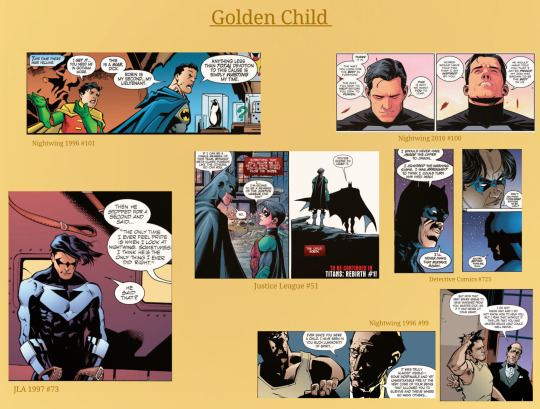
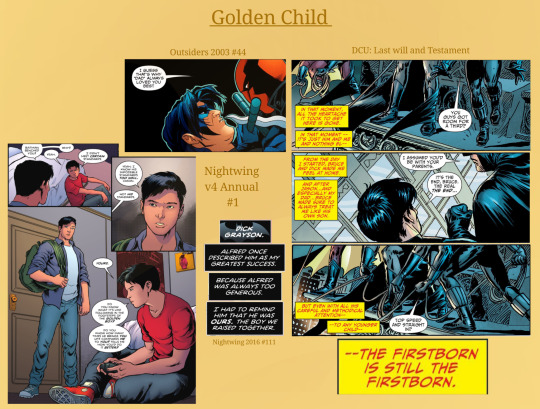
Here you can see the high expectations, praise for his accomplishments, his siblings feeling like Dick is better than them (i.e. treated differently than the rest), and you can also see how when he doesn't meet the expectations, he's met with disappointment (see: Alfred disappointed he's not as bright as he usually is) or judgment (see: Bruce angry at him because he isn't committing to his cause as much as he expects him to).
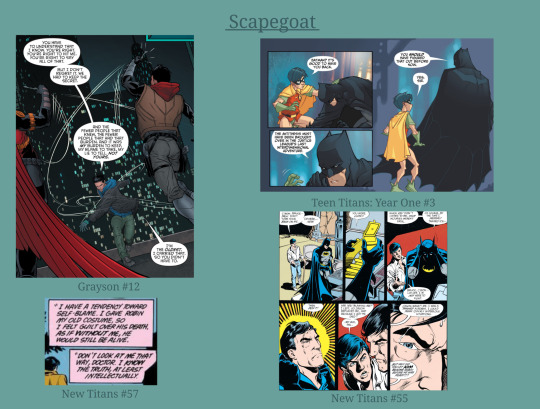
And these are examples of Bruce being too harsh on Dick and expecting him to do better, blaming him for his brother's death, and in result Dick having a habit of blaming himself and accepting mistreatment, thinking it must be his fault.
More often than not, Dick is put on a pedestal by his family and even his friends sometimes. They praise and love him, but when there's occasions in which he's acting less than perfect, the treatment towards him can change.
Dick Grayson can be the golden child as much as he can be the scapegoat.
#thank you for the ask!#dick grayson#nightwing#robin#bruce wayne#batman#jason todd#tim drake#alfred pennyworth#batfamily#golden child dick grayson#scapegoat dick grayson#dc comics#dc#character analysis#long post
269 notes
·
View notes
Note
About Tim's kill count: I think Tim tries really hard to be okay with murder. He's accepted that's something other vigilantes do, that sometimes it's the most practical answer. He knows that self defense is a thing, when it's you or them... Well, no one can be blamed for choosing themselves over a villain. He is the smart, logical Robin. He can be rational about murder. Stars know someone has to, and B is too much of an emotional mess when it comes to that particular subject.
So when Tim has to blow up Ra's bases, he tries really hard to be okay with it. He gave them a three minute warning (it's not much, but he knows how fast they are), so technically it's not like it's his fault if they decided to stay. He had to do it, it wasn't even just self defense, he had a civilian hostage to take into account. It was the only logical solution that allowed him to save Batman too. So yeah, he knows his reasoning was completely sound despite the circumstances. Honestly, he deserves Kudos for not losing it considering the amount of stress he was under and the fact he nearly died and lost an organ.
So yeah, he is pretty sure he's okay with it. He knows that if Batman ever truly catches up un his RR reports of that time he's not gonna be happy. He figures he can deal with that (he can't, he can barely deal with his own guilt. Deep down he knows he'll collapse like a wet napkin).
But instead of Batman the one to confront him is Jason having heard from Talia or finding the evidence on an outlaws' mission. And Tim is relieved because this should be easy. Not only is he a master manipulator: Jason is okay with murder, extremely emotional and still feels guilty about Titan's Tower. He's not even on talking terms with B. Tim has the upper hand in this encounter.
Cue to Jason's pov and it's just so painfully obviously that Tim is trying to rationalize the guilt away. Jason doesn't know whether to acknowledge it (the kid looks like he needs to actually talk about it, sue him) or to let him be delusional for a bit longer. He isn't the biggest expert on healthy but that doesn't look like it.
Tim succeeds in getting him to promise he won't tattle to Bruce, and is really proud of himself for handling the situation. Jason is now panicking thinking about what would Bruce do if he finds out (Tim doesn't know the extent of Batman's reaction to Jason killing at first).
(I got a little carried away with the idea of Tim being convinces he's okay with murder and Jason, who is pro murder for certain people, seeing right through him like "Oh honey")
Oh!!! I've seen some fics that cover what would happen if the Bats found out about Tim's kill count or the bases, but I haven't really seen ones with dark/abusive Bruce.
Tw: abuse, murder
Here's what I'm thinking:
Jason is fantastic for being the first to find out. He'd be supportive, understanding, and non-judgemental. He'll have no moral issues with murder. Perhaps he could have some mental breakdowns on the fact his younger brother had to resort to that or the high number of deaths or that someone younger than him had to stain their hands (which could also lead into him finally processing Damian's kills as well), but he wouldn't have any issues with Tim commiting murder.
Then we contrast that with Dick. He doesn't blame Tim. He's fiercely protective of his brother and will beat up anyone who gives Tim shit for it. On the other hand, he does have moral issues with murder. He'd probably have an internal debate with himself. He wants to support Tim, but the kid killed so many people (in this AU). Tim killed in self-defense. Dick has a particular understanding due to his time as a cop, but his vigilante rules have always contrasted with his cop ones (not just killing. Breaking laws, how civilians are treated, who your "allies" are, and whether you can trust your coworkers to do what's right). He's devastated that Tim was in that position and blames himself (maybe even takes those deaths upon his own moral conscience).
Both of them love, care, and support Tim in this. They also have very different ideas about murder.
Tim is also trying very hard to deny to himself how much death is actually on his hands. He's struggling to pretend he's fine and trying to logically convince himself that the deaths are acceptable.
In this AU, Bruce obviously flips the fuck out and acts like a piece of shit. Feel free to hc how far he takes that shit.
However, this has important ramifications against Damian. Whatever his feelings are about Tim at this point, watching his father abuse a kid he adopted (and considers his own) for the sin of killing? For self-defense? What if Damian ever kills again? Would Bruce react the same? What if there was no other choice? Also, does this mean that his father will never truly love him? Will his past always be held over Damian's head? Will Bruce ever forgive him? Is his father's love conditional? To add on, Damian has complicated feelings about LoA as well. He'd need to process the extreme destruction Tim enacted against the LoA. Just Damian having mental breakdowns.
Cass's confliction with murder and her love for Tim could also be added into this. I don't know much about the arc where she becomes a villain, but that would add to her turmoil.
Now, Alfred is a confusing one. How dedicated is he to Bruce? Is this the characterization where he sasses the man, not so subtly hides his guns around the Manor, and will stand up to the man? Or is this the one who will follow Bruce's lead even if it means psychologically torturing his grandkid? Is he somehow both at the same time? Can the kids trust Alfred to protect them or choose them over Bruce?
Babs would be protecting Tim (and the others in their support of Tim) to the best of her ability. In my mind, she's chill about murder due to her dad being a cop and her working with murderers (like Harley). She'd run interference to protect Tim until Bruce finds out, and then she'd be trying to get him away from Bruce.
Anyways, I'd love to see all of the characters, their feelings/experiences, and the conflict expanded on.
#tim drake#dc comics#dc universe#thank you for the ask!!!!#dc au#jason todd#dick grayson#damian wayne#bruce wayne#alfred pennyworth#barbara gordon#bad dad bruce
184 notes
·
View notes
Text
A (Negative) Analysis of Tom Taylor's Nightwing Run - Who is Dick Grayson?
Introduction Who is Dick Grayson? What Went Wrong? Dick's Characterization What Went Wrong? Barbara Gordon What Went Wrong? Bludhaven (Part 1, Part 2) What Went Wrong? Melinda Lin Grayson What Went Wrong? Bea Bennett What Went Wrong? Villains Conclusion Bibliography
When asked to describe Dick Grayson’s character, many will say he is good. He is Bruce Wayne’s light, the person he could have been had someone offered Bruce understanding and guidance after his trauma. Dick is a leader. A big brother. A mentor. He is someone people can look up to, someone others can trust. He is “The Heart of the DCU.”
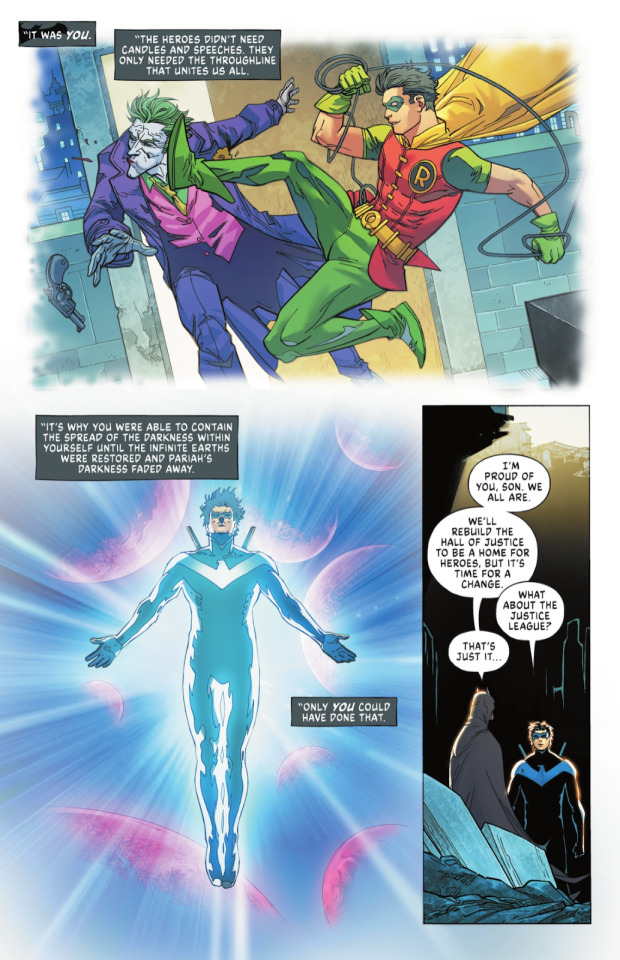
(Williamson, Joshua, writer. Sampere, Daniel; Herbert, Jack; Camuncoli, Giuseppe; Sandoval, Rafa, illustrators. Dawn of the DCU. Dark Crisis on Infinite Earth no. 7, e-book ed. DC Comics, 2022. pp. 28)
Characters, much like real people, are more than just a trait. Jason Todd is more than “angry.” Bruce Wayne is more than just “brooding.” Tim Drake is more than just “smart.” Characters are multidimensional. They have multiple facets, some of which may contradict one another because characters, just like people, are not created out of mathematical equations where two plus two always equals four. Humans are emotional. Their being is informed by past experiences, biology, culture. The intricate combination of these vastly different factors leads to inconsistency in rationality that may not always be logical. Dick being “good” does not mean that Dick can’t be angry, that he can’t make mistakes, or that he can’t lash out or be unreasonable, especially when stressed. Dick being “good” does not mean he can’t brood, does not mean he can’t be suspicious, nor does it mean he will always like everyone. Dick being “good” does not mean he can’t be his own worst enemy, that he can’t be calculative and strategic, that he always needs to be upbeat, or that he can’t be the most intelligent person in the room.
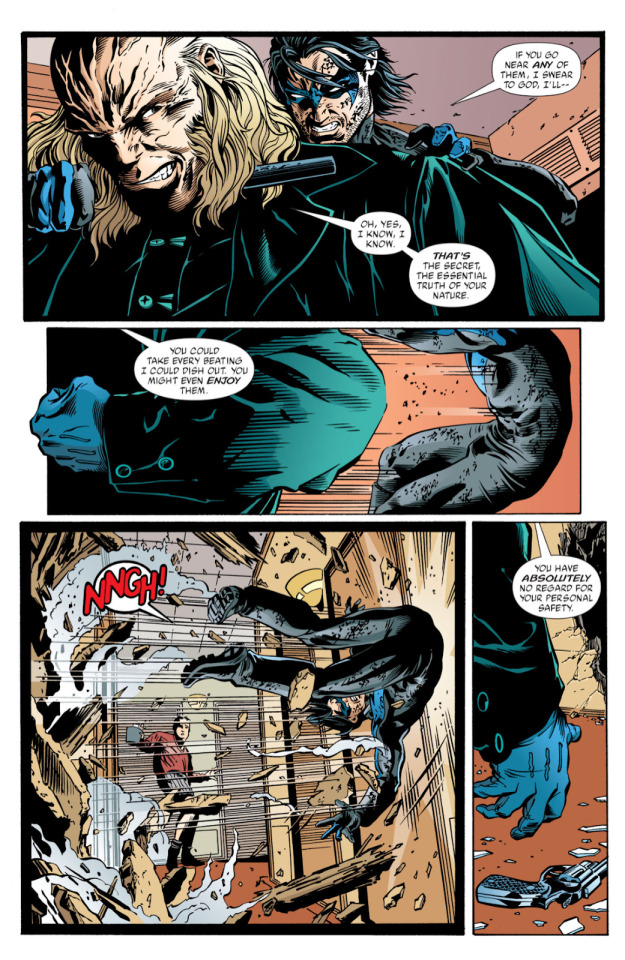
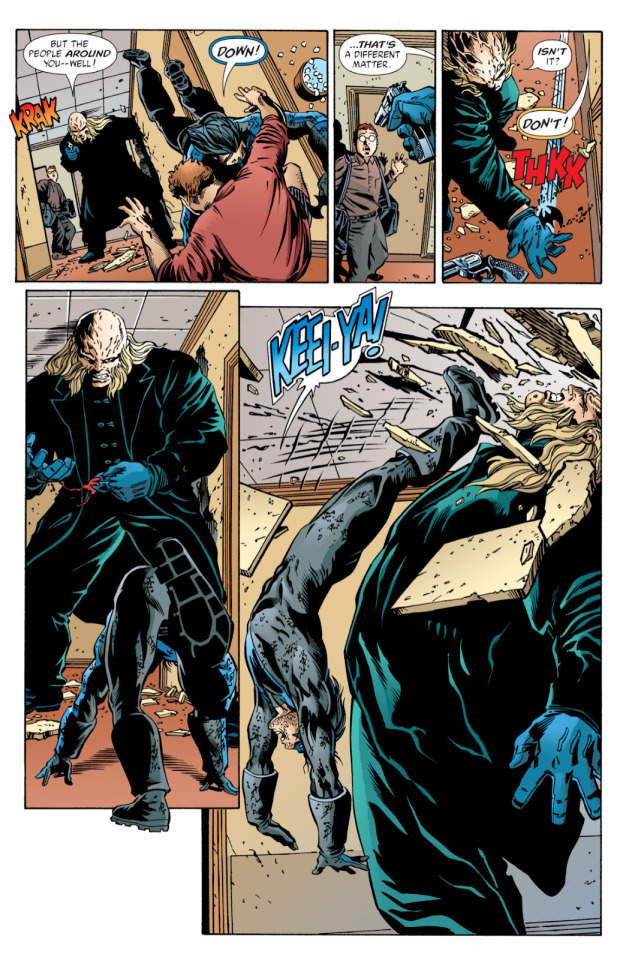
(Grayson, Devin, writer. Zircher, Patch, illustrator. Slow Burn. Nightwing no 93, e-book ed. DC Comics, 2004. pp. 10-11)
Sam Humphries also demonstrated this during his brilliant story, The Untouchable. There, Dick’s relentless determination to save people from the Judge’s machinations grows so intense that it becomes self-destructive. The story demonstrates how Dick’s “goodness” comes from a form of toxic perfectionism that has been with him since he was a child — a perfectionism born of a low self-worth that eats at him from the inside out
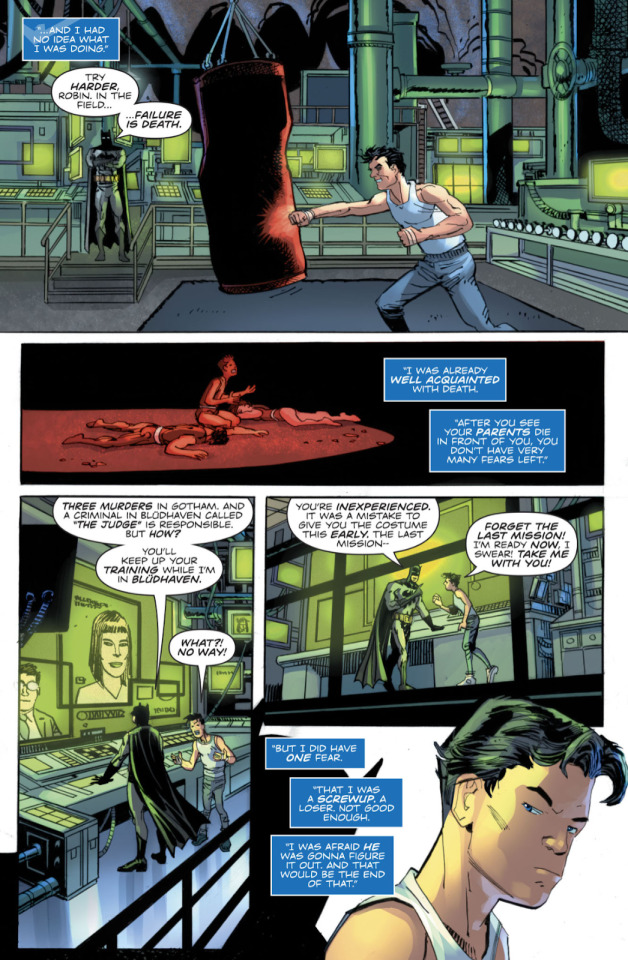
(Humphries, Sam, writer. Janson, Klaus; Campbell, Jamal, illustrators. Ruthless. Nightwing: Rebirth no. 37, e-book ed. DC Comics, 2018. pp. 08)
Even the 2003 animated series Teen Titans understood that in trying to catch the bad guy — almost always Slade Wilson in the case of that show — Dick could sometimes go too far.
Dick’s goodness causes him to see himself as a danger to not just his loved ones, but everyone who stands near him. He carries the world on his shoulders, taking the blame for every tragedy and seeing every death as a personal failure. When pushed to its worst, Dick’s goodness becomes an obsession which pushes others away, leading to isolation as Dick’s entire existence narrows down to accomplishing one specific goal.
It is this reductive characterization of Dick – the idea that his one defining trait is that he is “good” – that leads many to misunderstand the appeal of his character. As I mentioned above, characters are multi-facet, and Dick is no exception. However, the ways in which Dick is multi-facet are very different from the ways in which most characters are multi-facet.
Please do not mistake what I am about to say by claiming these other characters are not complex. Or even that some of them might not subvert popular tropes. What I mean saying is that Dick’s complexity is demonstrated differently than what I believe most people are accustomed to.
For example, everyone knows Bruce Wayne keeps his feelings locked up inside. He compartmentalizes his emotions and his trauma in order to solve the puzzle put ahead of him. But everyone – characters and readers alike – understands Bruce is doing this. Everyone can tell that he is hiding something from others and keeping them at a distance. The reader is always aware of how Bruce’s trauma informs his actions, his interactions, and his thought process.
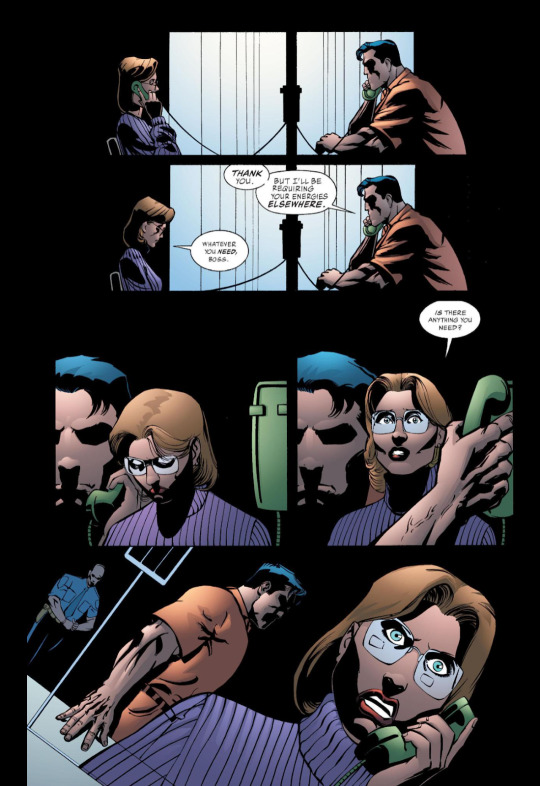
(Grayson, Devin; Barr, Mike W., writers. Davis, Alan; Robinson, Roger, illustrator. Procedure. Batman: Gotham Knights no. 25, e-book ed. DC Comics, 2002. pp. 20)
Take, for instance, Part One of Murderer/Fugitive. Although a major source of tension from the story surrounds the question of Bruce’s innocence, there’s never any question in the minds of the reader and the character that Bruce is hiding something. Tim Drake questions whether Bruce truly did kill Vesper Child and is hiding his motive, while Dick is certain of Bruce’s innocence and instead believes Bruce is hiding his alibi or the clues that would help them find the real murderer. Barbara Gordon, for her part, wavers between the two, but like Tim, Dick, and the reader, she is certain of one thing: Bruce Wayne is hiding something from her, from them… From us.
Similarly, Jason Todd’s anger comes from a place of hurt and a place of love, from insecurities and a need to prove himself. But like Bruce, all of that is clear to see. His anger and his hurt are simple to understand. Please, do not mistake this for me claiming that Jason is not a complex character — instead, I’m stating that his temperament, his trauma, and his actions are so interlinked that they are clear for the reader to see. His character, while rich, is more accessible. It does not take a lot of effort to know that Jason is angry because of what was done to him. It is easy to see that he is hurt because he equates Bruce’s love to the Joker’s death, and therefore sees Bruce’s failure to avenge him “proof” that Bruce does not love him as a son.
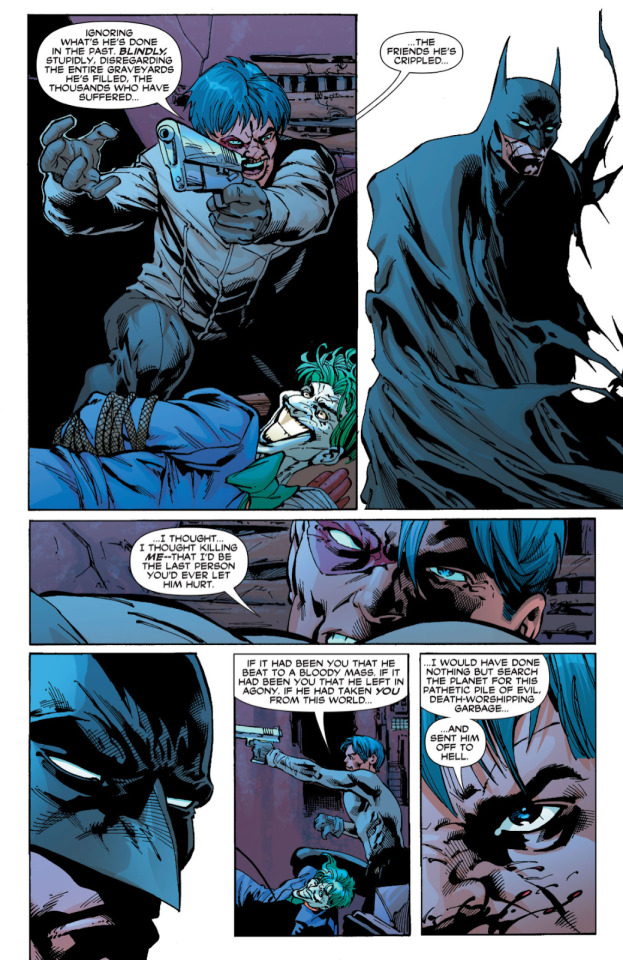
(Winick, Judd, writer. Battle, Eric, illustrator. All They Do is Watch Us Kill: Part 3: It Only Hurts When I Laugh. Batman no. 650, e-book ed. DC Comics, 2006. pp. 13) Dick, on the other hand, does not wear his emotions, his motivations, or his goals on his sleeve. Dick keeps his secrets not by constructing an impenetrable wall like Bruce, but through misdirection. This is why those who are unfamiliar with Dick misinterpret him so much. They take what is on the surface at face value because they do not have the character history to serve as context to understand what lies beneath As a Dick Grayson fan (From this moment forward will be referred to as Dick Grayson Fan A) said “good Dick writers teach readers how to read him and bad Dick writers just have that surface level interpretation.” (I was actually talking to her about this idea and how I’m presenting it in this essay. The example I gave was one she suggested after I asked if she could think of good moments that exemplified this idea.)
As an example, we can look at this moment from Grayson, in which Dick sucks a lollipop while receiving a mission assignment. Someone who is not familiar with Dick and is looking at Dick and Helena’s interaction might be easily fooled into thinking that Dick is the pretty, strong, but annoyingly childish and slightly dumb male character who contrasts the serious, intelligent, and highly competent woman. The characters’ expressions, actions, and the onomatopoeias are certainly leaning into that familiar trope.
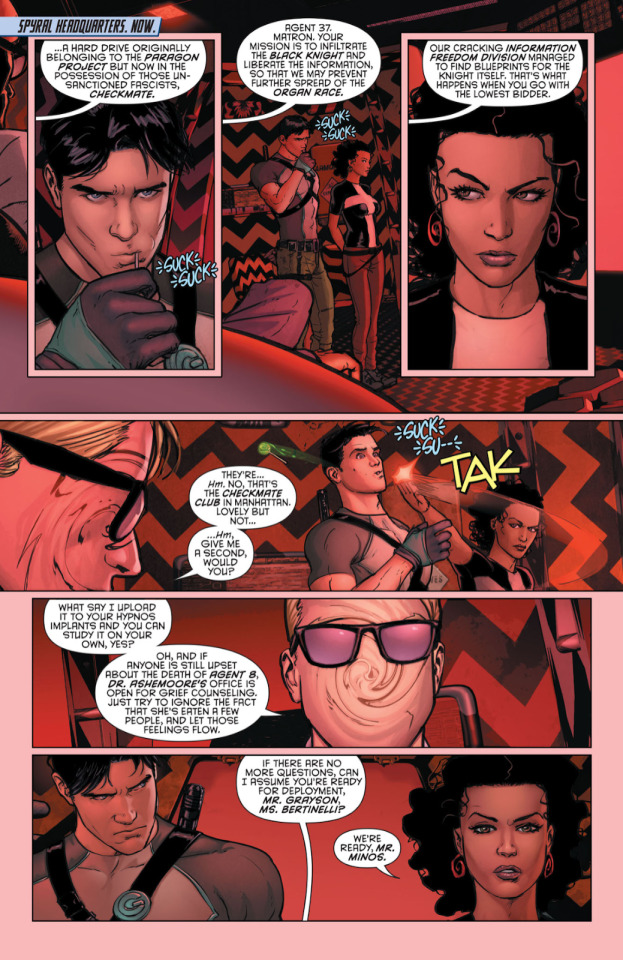
(King, Tom; Seeley, Tim, writers. Janin, Mikel, illustrator. The Raid. Grayson no. 04, e-book ed. DC Comics, 2014. pp. 02) However, Dick Grayson fans know that when it comes to the mission, Dick is as serious as Batman himself. Highly intelligent, Dick is considered to by many the world’s second greatest detective (there are many instances in canon when he is referred to as such), making him more than just a pretty face who knows how to fight (It should be noted that in this tweet, writer Tom King also ranks Dick as the second best fighter in the Bat Family). Furthermore, context matters. Dick is deep undercover throughout the duration of Grayson, and this scene is set shortly after the death of one of the agents of the organization Dick has infiltrated. In other words, Dick is in a highly stressful situation without allies to provide him with back-up or emotional support.
His posturing in this scene, then, can be seen as an attempt to misguide and misdirect. He does not wish to let those around him – people he is not sure yet if he can trust – know the full extent of his capabilities or perceive any potential weaknesses in his value of human life. Positioning himself as the annoying and childish pretty boy who does not pay much attention to serious matters is a strategic choice that his fans readily pick up on.
That is not to say that Dick’s smiles are all lies. Rather, Dick’s upbeat nature is a natural aspect of his personality that he will exaggerate depending on the setting in order to keep his privacy. He is a natural performer, a showman, and so he utilizes misdirection to his advantage.
A classic example of Dick’s misdirection and how he is misinterpreted by others is how some would characterize him as an “attention seeker.” However, the term “attention seeker” has negative connotations as it implies someone who seeks the spotlight at the expense of others.
That is the opposite of who Dick is. But that’s not Dick is. As a mentor, a leader, and an older brother, Dick will often invite others to join the conversation. He pays attention to what they say, he strategizes based on their needs.
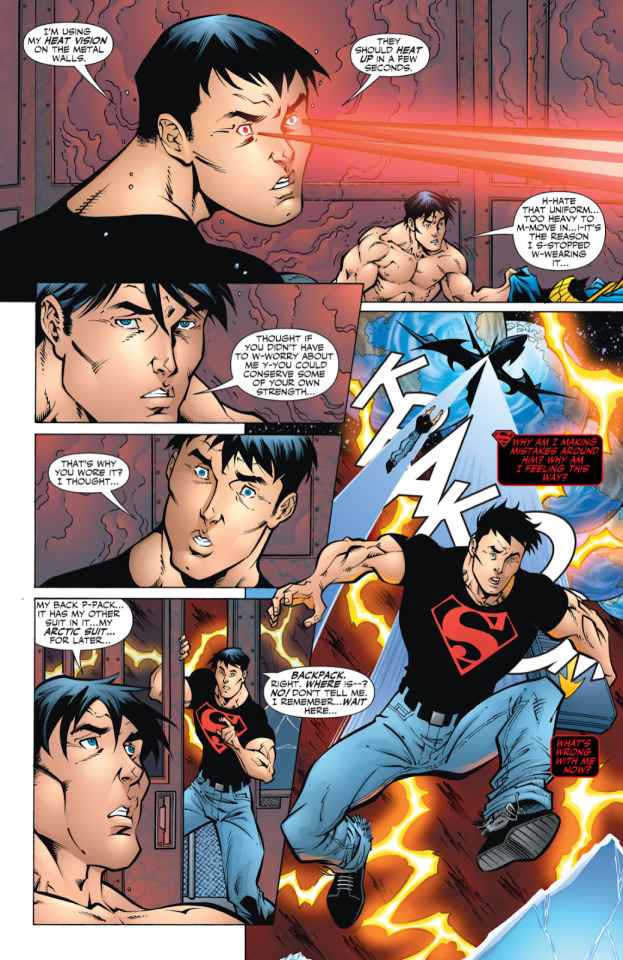
(Johns, Geoff; Wolfman, Marv, writers. Nauck, Todd, illustrator. The Brave and the Bold. Teen Titans no. 33, e-book ed. DC Comics, 2006. pp. 15)
Simply put, Dick is incredibly empathetic and always in tune with those around him. This is why he works so well as both a Bat and a Titan, and why his personality in each team is so distinct. As a Bat, Dick is often portrayed as cheerful, his bad puns are meant to cut the tension, the is the shoulder for his family to cry one; as a Titan, Dick is a leader, he is a strategist, he demands others take things seriously and will not tolerate slacking off, he is trying to instill good work ethics and ensure that the team dynamic stays in top shape.
As JL Bell writes in their essay Success in Stasis: Dick Grayson’s Thirty Years as a Boy Wonder for the book Dick Grayson, Boy Wonder: Scholars and Creators on 75 years of Robin, Nightwing, and Batman explains, “in contrast to how Robin behaved with Batman. [Dick] is usually [the Titans’] serious leader.” (Bells, JL “Success in Stasis: Dick Grayson’s Thirty Years as a Boy Wonder.”Dick Grayson, Boy Wonder: Scholars and Creators on 75 years of Robin, Nightwing, and Batman edited by Kristen L. Geaman, McFarland & Company, Inc., Publishers, 2015, pp. 22)
That is because Dick knows that when he is with his family, he needs to play one role, and when he is with his friends, he needs to play another. The Bats have their strengths, so Dick adjusts himself to play up on those strengths while also making up for its weakness. Same thing with the Titans.
Mark Waid perfectly exemplifies Dick’s adaptability when portraying him in his World’s Finest (2022) and World’s Finest: Teen Titans (2023). There, Dick brings levity to his work with Batman and Superman, keeping an upbeat attitude while still taking the job seriously.
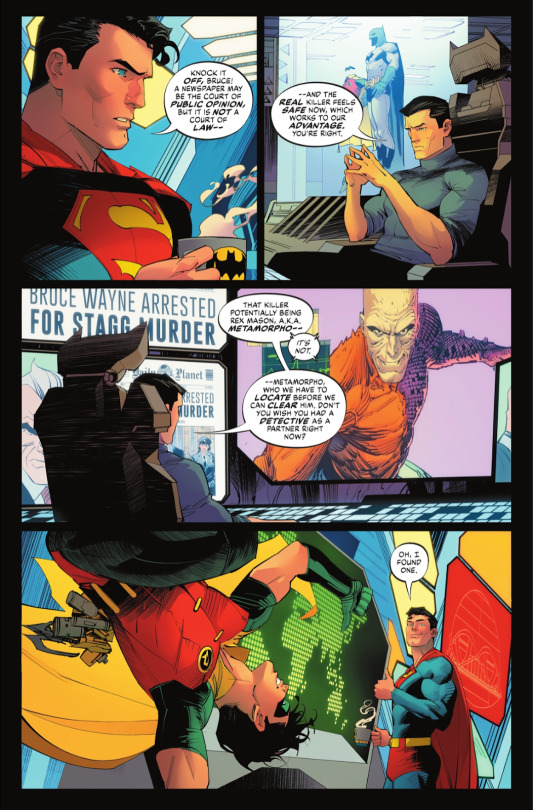
(Waid, Mark, writer. Mora, Dan, illustrator. Manhunt. Batman/Superman: World’s Finest no. 14, e-book ed. DC Comics, 2023. pp. 07)
Yet, when he is with the Titans and feels the weight of leadership on his shoulders, he is more serious, being the one to get the Titans to focus on their objective, getting them to look at the big picture, while also making the most of their abilities as individuals and as a team.
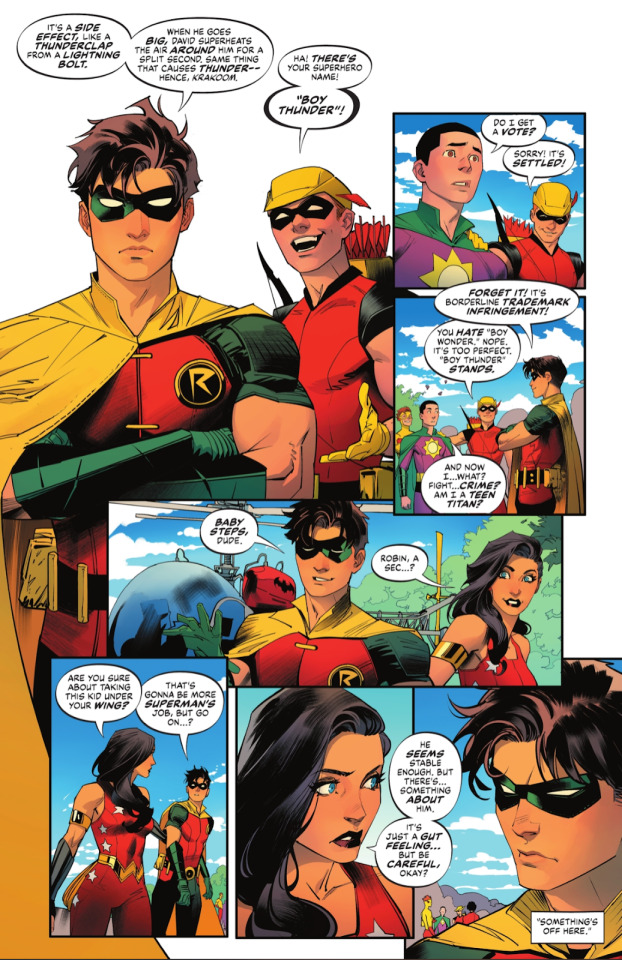
(Waid, Mark, writer. Mora, Dan, illustrator. Team Spirit. Batman/Superman: World’s Finest no. 08, e-book ed. DC Comics, 2022. pp. 05)
So yes, Dick is a performer, a showman, but he is not “attention seeking.” In fact, his use of misdirection illustrates that Dick is a very private person. And how could he not be? While it is true that Dick grew up in the circus, after his parents’ death, he went to live with Bruce, and in doing so, was put into an intense amount of public scrutiny. The murders of John and Mary Grayson happened on a literal stage with dozens of people watching. As a result, Dick’s very private tragedy became a spectacle.
After the death of Dick’s parents, Dick isn’t allowed to disappear into anonymity. He is not afforded privacy to grieve. He is taken in by Bruce Wayne, Gotham’s most famous playboy, billionaire, philanthropic who is also a bit of a selfish airhead (at least, that is how the public perceives him), and as a result, Dick is subjected to an immense amount of public scrutiny, not just from the media, but also from Gotham’s elites, and even his peers at school. Not only that, as Robin, the Boy Wonder and the first ever sidekick, Dick also is put on the spotlight while also being aware of the necessity of keeping secrets.
As a result of having his tragedy broadcasted and having a new mission that requires secrecy, Dick becomes a very private person. He is not an open book; instead, he is meticulous about what he shares and he prevents people from looking at what is not of their business by using his showmanship.
Furthermore, Dick’s role as a performer who, as Joshua R Pangborn describes in his essay about the Robin costume, “experiences […] the full spectrum of emotions, each and every night, for the catharsis of others,” transforms him into a literal vehicle for emotional catharsis and empathy. (Pangborn, Joshua R “Fashioning Himself a Hero: Robin’s Costume and its Role in Shaping His Identity”Dick Grayson, Boy Wonder: Scholars and Creators on 75 years of Robin, Nightwing, and Batman edited by Kristen L. Geaman, McFarland & Company, Inc., Publishers, 2015, pp. 42) In their essay, Bell argues that while Bruce Wayne embodied “the mid-century ideal of the American male,” who is always “in control of his feelings, not letting them overcome his judgment nor displaying them broadly,” Dick Grayson “can express deep emotions, not only his own but Bruce’s.” As such, Dick often acts as a sounding board for his family, friends, team, and romantic partners. As a performer, Dick embodies whatever persona is necessary to create a safe environment where others can process their emotions and achieve catharsis. (Bells, JL “Success in Stasis: Dick Grayson’s Thirty Years as a Boy Wonder.”Dick Grayson, Boy Wonder: Scholars and Creators on 75 years of Robin, Nightwing, and Batman edited by Kristen L. Geaman, McFarland & Company, Inc., Publishers, 2015, pp. 12)
Dick's performance, then, comes not just from a desire for privacy but also from a deep place of empathy. It comes from a desire to help others work through their own stories. This is why he can step into other's narratives without overshadowing them. In fact, he’ll often elevate those characters by complimenting them and creating the circumstances needed for them to shine. As a performer, Dick is naturally adaptable and always willing to fill the role necessary to create the space required for others to work through their emotional needs.
But, as with everything, Dick’s performance is also a result of his destructive perfectionism. Dick equates “good” to “perfect.” He believes that he can only be wanted by Bruce if he is the perfect Robin, he can only be wanted by his friends if he is the perfect leader, he can only be wanted by his siblings if he is the perfect older brother, he can only be wanted by his partners if he is the perfect boyfriend. As Humphries’s The Untouchable demonstrates, because Dick was raised in an environment where failure could be fatal, he internalized these stakes to every aspect of his life.
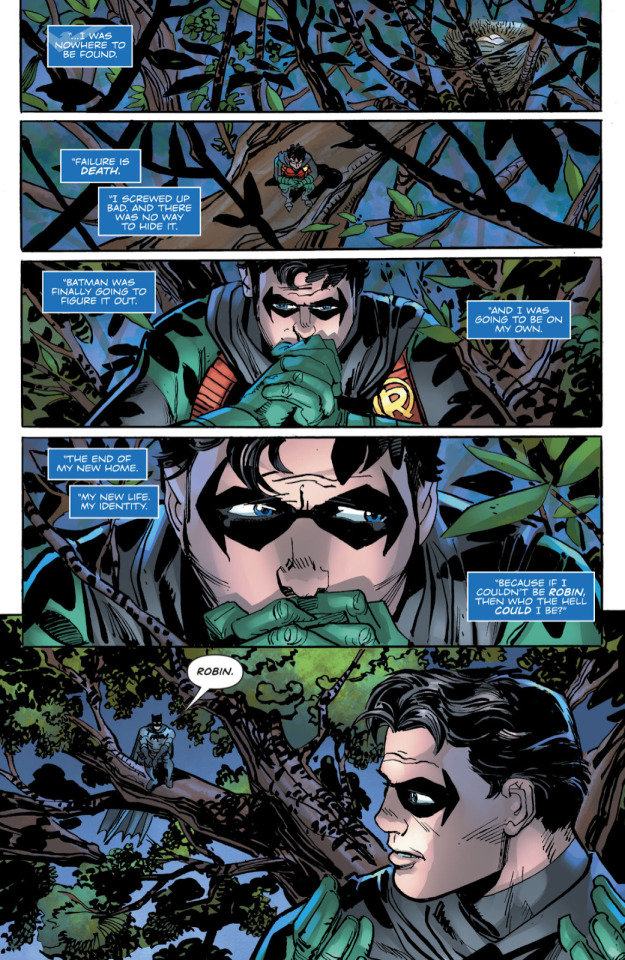
(Humphries, Sam, writer. Janson, Klaus; Campbell, Jamal, illustrators. Ruthless. Nightwing: Rebirth no. 37, e-book ed. DC Comics, 2018.pp 20
And it doesn’t help that all of the people in Dick’s life do prove that assertion right. Everyone holds “the Heart of the DCU” to an impossible standard that, when Dick fails to live up to it, he is crucified and punished for it. If he tries to be perfect, he's told off for being the Golden Boy, but if he fails to be the Golden Boy, then he is told off because he let people down when they were relying on him. Ironically, this is done by characters in-universe real-world fans. As Dick Grayson Fan A pointed out in a discussion about depiction of Batman Family members killing their antagonists, “there's always this pressure to have Dick ~fall from grace~ and I do lowkey resent that. Dick should be allowed to be good, not punished for it.”
This creates an environment where Dick constantly needs to maintain perfection in order to be in everyone’s good graces. Failure is not met with understanding and comfort, but with punishment. No one expects him to fail, no one likes when he fails, no one forgives him when he fails. That also means that Dick doesn’t feel safe opening up about his insecurities because to do so would mean “proving” he cannot stay on the pedestal he’s been put on. And so, he is forced to perform the role of a “perfect good guy” by using misdirection so people won’t abandon him for being human (this was said during a very interesting discussion and addressed both canon and fanfic writers. There’s a lot that can be said about Dick’s parentification and how that is viewed in the context of fandom. This is not the essay for it, and, to be perfectly honest, I’m not entirely sure I’m the best person to open said discussion).
Taylor does not portray Dick as someone with this many layers. Taylor’s Dick is perfect simply because he is good. He is the perfect friend, who is always happy to support others. He is Barbara Gordon’s perfect boyfriend. Dick is the perfect older brother, the perfect son, perfect model citizen.
But by equating being “good” with being “perfect” without exploring the negative consequences that come from such pressures, Taylor robs Dick of the emotions that humanize him. In Taylor’s run, a good person will not be angry at their friends, will not be frustrated with their siblings, will never disagree with their romantic partner. This strips Dick of all of his nuances, and instead reduces him to a non-descriptive “everyman hero” with a limited emotional range whose only narrative purpose is to serve as a blank canvas for readers to project themselves into.
Simply put, Taylor is uninterested in writing Dick as a character because he does not see value in Dick for who he is. Nightwing #105, which removes Dick from its story in order to allow its readers to “be Nightwing” illustrates how Taylor and DC at large only value Dick his connections, not for who he is.
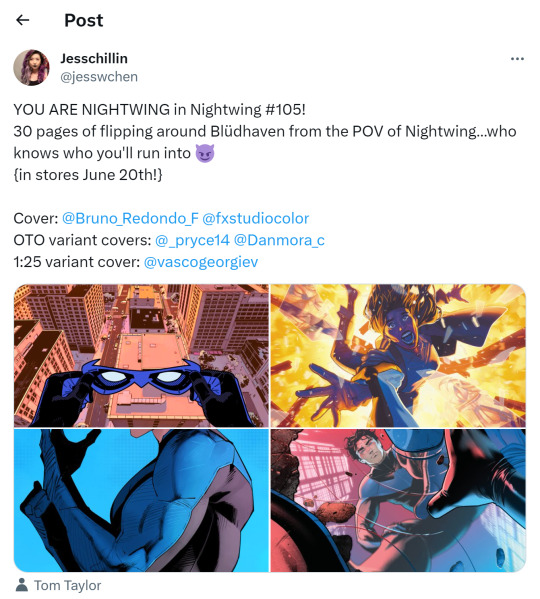
(Chen, Jess [jesswchen]. “Tweet Message.” 18 March 2023, https://twitter.com/jesswchen/status/1636971185782259716?s=20.)
Be Dick, and you can be good friends with Superman! You can be Batman’s son! You can be Batgirl’s boyfriend! Robin’s big brother! Flash’s best friend!
As a Dick Grayson fan, this feels insulting. I’m not saying Dick needs to be anyone’s favorite character, or that anyone even needs to like him. I’m not interested in dictating anyone’s taste. But to someone who loves Dick Grayson, it is insulting to think that those responsible for his stories fail to see his value. To Taylor, the person who, as the writer for both Nightwing and Titans, has the most control over Dick’s portrayal, Dick is nothing but a tool that will soon wear off its use.
In treating Dick as such, Taylor and DC send a clear message to those of who love Dick, and that message is that the things that make Dick special, the things that made us love him, do not matter.
For his near century long existence, Dick served as a stand in for those who feel othered in society. While I do not have the time to go into a gender studies and queer reading of Dick, it is notable that his character often spoke to many people who felt different. As Mary Borsellino’s 2006 essay “A lot like Robin if you close your eyes” Displacement of meaning in the Post-Modern Age explains:
The things which a Robin-like figure can contain, but which are cut off from being embodied by Robin himself, lose none of their importance simply because they are rejected by a restrictive, corporate-controlled status quo […] It's worth inspecting what was excised from Robin, and charting where these elements instead found articulation: in those from lower socioeconomic backgrounds; non-White people; young single parents; and HIV positive people. And, especially, girls and women (Borsellino, Mary “‘A lot like Robin if you close your eyes.’ Displacement of meaning in the Post-Modern Age, 2006)
While Borsellio’s essay focuses on the Robin mantle, as the creator of said mantle, such assertions can also be applied to Dick. In fact, Bell concurs with the idea that those who were othered have always took a preference to Dick when stating that “Robin’s status as the littlest guy in the fight increases the character’s appeal for some children, especially the ‘youngest and weakest.’” In other words, it is crucial to Dick’s character that he is not an “everyman hero.” He is not the hero of or beloved by the average individual, but rather by those who were ostracized by society.
Taylor’s writing exemplifies the “restrictive, corporate-controlled status quo” imposed by DC that Borsellino speaks of. His characterization is the manufactured image that removes Dick’s “socially deviant/rejected” qualities his fans loved about him so that he can be palatable to a more mainstream audience. (Bells, JL “Success in Stasis: Dick Grayson’s Thirty Years as a Boy Wonder.”Dick Grayson, Boy Wonder: Scholars and Creators on 75 years of Robin, Nightwing, and Batman edited by Kristen L. Geaman, McFarland & Company, Inc., Publishers, 2015, pp. 11)
This, of course, is not necessarily new. As Mason Downey argues in their 2015 essay In Defense of Dick Grayson: Objectification, Sexuality, and Subtext, DC has often struggled between leaning into the audience Dick has and wanting to erase any “othering” elements from his character. As they point out:
The more sexual and idealized Dick was allowed to become, the more attention he got from female and queer fans, the more the industry had to work to combat the past anxieties revolving around the character. This resulted in more and more heteronormative romances for Dick on the page. We can’t grant Wertham’s fears any legitimacy, we can’t make these stories “for girls.” Writers did so in a few ways, some obvious, some less so. On the page, we had Dick’s deflection of female sexuality that he was not in control of, and we had a level of emotional posturing with relationships he was in control of. We had moments where we saw him manipulating with or being manipulated by sex. There were editorial pushes to lean into Dick’s popularity with women and queer men coupled with the simultaneous desire to not acknowledge or grant legitimacy to the fanbase he found in those demographics. This translated to more sexualized poses. More pin-up style spreads. Multiple bait-and-switch wedding, marriage, and relationship teases which turned out to be fakeouts or got written out. Long strings of female side characters were introduced exclusively to be love interests. Off the page, we had more concrete examples. We saw a lack of merchandise and lack of representation of him in other forms of media. There was a pervasive hesitancy in broaching his existence outside of the spheres of already established fans. For example, Nolan’s The Dark Knight Rises featured Joseph Gordon-Levitt playing a character literally named Robin, who was invented for the film franchise rather than allowing Dick himself to exist in that cinematic universe. Dick Grayson is a character built upon one repeated mantra aimed at what eventually become two of his largest demographics, “Remember, this is not for you.”
(Downey, Mason “In Defense of Dick Grayson: Objectification, Sexuality, and Subtext” Women Write About Comics. December 2015)
What makes Taylor’s run unique is that in trying to have Dick tackle social issues such as homelessness and in trying to create a class commentary, Taylor attempts to create a progressive, albeit simplistic, veneer while erasing the important and “other-ing” aspects of Dick’s character that was so beloved by his fans.
This, I believe, is one of the many explanations why many of those who praise Taylor run claim that this is the first Nightwing run they ever enjoyed, while many (though admittedly, not all) those who have been longtime Dick Grayson fans feel betrayed and frustrated by the way their beloved character is being handled. Dick is currently being appropriated into a more mainstream, palatable hero. He is being taken from those who loved him and being scrubbed clean to be suitable for an audience who could not appreciate him for what he was, only for how his connections could give them a wish fulfillment fantasy. As another Dick Grayson fan expressed:
I see no heart in [Taylor’s] work, only soulless marketing. He sells himself as something good and work on his perfect public image and everyone who disagrees is wrong and it gets on my nerves like nothing else. […] I wouldn't be as salt[y] if Taylor was genuinely trying to writing something good. I don't have the heart to [be salty] at someone working with passion, even if I don't like it.
(Henceforth referred to as Dick Grayson Fan B... This was actually said during a discussion in which we expressed how we wish we could be as excited about Taylor’s run as many others are.)
315 notes
·
View notes
Text
Angst because it’d sun to feel every once in a while
Bruce has never known a day of peace since he took in Dick as his ward, not because he’s a father now and it led to him adopting multiple other little hellians. Because all of his children love to prank and spite him. Dick (surprisingly) was the most tame out of them all, only occasionally hiding things from Bruce or using nerf guns against him at the most inconvenient times (galas especially).
Jason after living on the streets for a few years picked up on how to be EXTREMELY quiet and how to hide well. Without any pattern or explanation Jason would just randomly disappear from the manor, sometimes to make it more interesting he would stage it like he ran away or that someone took him. Bruce believes Jason wanted to give him a heart attack before 50. Jason always tried to get Dick to join in on the little pranks but with Dick and Bruce not having a good relationship, he never got the chance to. (Jason staging “running away” and “kidnappings” were the reason Bruce wasn’t immediately freaked out when Jason wasn’t in the manor when he went to Ethiopia. He just thought Jason was pranking him.)
Tim is in for a rude awakening when he tries to prank Bruce. It’s been a while since he became Robin, him and Dick are incredibly close and he’s started staying at the manor more often than not. Bruce ruffles his hair and laughs at his jokes, they even had a movie night the other day! So when Dick subtly mentions how he used to prank Bruce and that Jason followed in his footsteps, he feels like it’s a right of passage for Robins to do so. Tim accidentally brings back an old memory of Jason by doing a prank like Jason would do, Bruce just freezes when he sees Tim and leaves the room. Tim doesn’t prank him after that. (Bruce immediately realizes his mistake after Tim never tries to participate in pranks again but is too socially inept to fix things.)
Damian thinks pranks are ridiculous and stupid. He never attempted one until Dick pranked Bruce one day a few months after he came back from the time bs. It’s the first time Damian watches Bruce wheeze, he pulls Dick into a tight embrace and kisses his forehead and it fills Damian with an ache he’s never felt before. So, he researches pranks he can try and asks Jon for assistance. In the end he tries something small, he puts saran wrap on the entrance to the kitchen in the evening. Bruce absolutely eats shit but laughs all the same when he sees Damian giggling from the dinner table. (Tim pretends not to notice the commotion from his tablet. There’s a lump caught in his throat throughout all of dinner.)
Steph only pranked Bruce whilst on patrol as Robin. She hasn’t done it since and rationalizes the pain she feels by saying “every Robin does it” instead of “all his kids do it.”
Duke? He will help others pull off their own pranks, he never makes one of his own. He doesn’t feel as though it’s his place (even though he lives there and Bruce loves him all the same. Sometimes he can’t believe it)
Cass blames her pranks on others, she wants to be included with her brothers but doesn’t know what Bruce’s reaction to her pranks would be if he knew they were her own (he does know, he sees her set them up but still acts as through he doesn’t see them)
Jason re-enters the family with a prank, he hides in Bruce’s study whilst he waits for him to get home. He cannot honestly say what he hopes to achieve in doing this, he just wants a sense of normalcy that he had when he was little he misses his dad and just wants a hug again (touch starved Jason is canon you will not tell me otherwise). The prank worked, Bruce got scared but upon realizing it was Jason he immediately pulls him into a hug and kisses his forehead. Jason melts completely and stays for dinner that night upon Bruce’s request.
Tim watched on from afar as they all prank Bruce. A privilege he doesn’t believe he deserves. It’s noticed by everyone but no one knows why he doesn’t except for Bruce, the one person who is physically incapable of being emotionally vulnerable. So Tim watched on as his siblings get forehead kisses and full belly laughs and he’ll give them half smiles and thumbs up as he escapes to another room (most likely the cave) so he can bury his sadness for another day.
#jason todd#bruce wayne#batfam#dick grayson#tim drake#batfamily#damian wayne#batman#duke thomas#stephanie brown#cassandra cain#batfam angst#because i can
209 notes
·
View notes
Text



I will say that, as frustrating as the arguments in Gotham War are, this part struck me as 100% in character. I was reading the Joker War storyline and Bruce's hallucinations of Alfred were forcing him to confront the fact that, on some level, he still held it against Damian for triggering Alfred's death, still held it against Dick for having amnesia and not being there to help, still held it against Selina for taking him out of the city, and it wasn't meant to be a fair blaming, it was meant to be that this is what Bruce struggles with. And it struck me how much this was a pattern with Bruce, that he's even aware of it before Alfred's death, in the Nightwing series, he admits that he blamed Dick for making Bruce need him so much (loving him so much, basically) and then leaving him. Bruce struggles with how much he loves all these people, lets them into his heart, and then some part of him desperately wants to idealize them, the way he idealizes his parents. That his reaction to Selina's plan isn't just "poor little rich boy whose parents were killed by a robber" (which, by the way, does still have a point, it isn't less horrific that they lost their lives just because they had money, and we see that Selina's way is going to get people killed), but also Bruce's trauma is playing a big part on all his kids and extended family, because he struggles with idealizing them, struggles with, "we are all in his life because we were victims of a crime, how can any of you decide that the thing that drew us all together doesn't matter?" How can they say that the thing that forged their family into the unbreakable bonds is something that they can just decide no longer matters to who they are and why they do what they do? It's not rational, it's not justified, it's striking out in hurt and anger, but it's also partly coming from a place of love for his family and very much coming from a place of trauma and Bruce's complicated relationships with what he does and the family he surrounds himself with, the family that began to let him heal after the death of his parents. And, to him, it feels like that is slipping away, if it's so easy for them to decide that it's okay that some people are victims--because Bruce didn't just let anyone join his family, they all had to stand up to him trying to stop them first.
How many times did he try to stop a young Dick Grayson from going after Zucco? How many times he did he try to stop a young Barbara Gordon from becoming Batgirl? How many times did he try to keep Tim from this life? How many times did he try to stop them, only for them to stand up and say, "I won't let anyone else become a victim like I was."? How many times have we commented about how Bruce wasn't training child soldiers, he was putting leashes on the kids?
That is what made them acceptable in this life--and now, suddenly, it doesn't matter? Yeah, I 100% believe Bruce would react this way.
366 notes
·
View notes
Text
You know one thing that kinda bother me about the entire spiral arc with Dick ? And it's not just the "let's all blame only Dick instead of Bruce for the whole thing".
How do the batfam think he died exactly? I mean he did die, for a few minutes at least, but that's not my point. My point is what did Bruce tell them about his death ? I'm assuming he told them Lex suffocated him to save them from the bomb. So then, the question becomes... Why did no one in the Batfam, knowing that, go after Lex ? I'm not saying they would try to kill him but are you trying to tell me none of them were like:
"Woah, my brother, a superhero died, that's very convenient for Lex supervillain known for disliking superheroes in general Luthor, maybe he didn't do the most to save him afterwards either, maybe I should look into that ?"
Also grief isn't rational, Bruce immediately went after Lex, knowing he was saving the world.. Why would they not do the same thing ?
#dc comics#batman#dick grayson#nightwing#jason todd#tim drake#damian wayne#(i mean he was dead at the time but i'm tagging him anyway)#bruce wayne#cassandra cain#barbara gordon#stephanie brown#also edit: there were other people who saw Dick alive after that if any of them did any investigation and/or ask Catwoman this would have#been solved ?#or cyborg ?
97 notes
·
View notes
Text
Hot take, but I don't think Jason is as unreasonable about his not being avenged in Lost Days/UtRH as we often think. Which: I definitely think his feelings in UtRH do come from a place of anger and hurt that isn’t very rational. That said, viewed narrowly, I think a couple moments from Jason's '80s Robin run make Jason's post-resurrection conclusions about how Bruce should have acted upon his dying make a kind of sense. (Full disclosure: I did not touch pre-Crisis content).
I know this panel from Detective Comics #570 makes the rounds fairly often:

But the context is sort of interesting: the person Bruce "lost" is Catwoman and she's very much alive. The Joker just brainwashed her back to being "bad" after she had been on the straight & narrow. (Notably, brainwashed "bad" Catwoman still balks at murder and protects Bruce's secret identity under duress, so "bad" seems pretty relative here).
So Jason's holding Bruce back from murder not because The Joker killed someone he cared about, but because Selina's returned to her old ways. This is flat-out murderous revenge and no one even died.
I think, in conversation with the below panel from Batman #425, there's something to talk about:
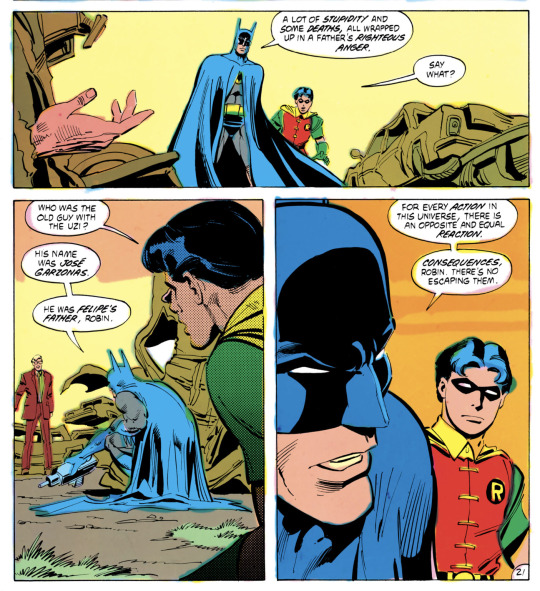
(For context, this is the father of the rapist who Jason may or may not have killed in Batman #424, who somehow magically intuits Jason is responsible for his son's death and is seeking his own vengeance.)
I don't think this necessarily reads as Bruce exonerating José Garzonas, but that he identifies the events of the comic as coming from "a father's righteous anger" implies that Bruce believes there is some degree of right behavior on Garzonas' part. Fathers, after all, avenge their sons.
Additionally, while I think from the perspective of the living that Tim being Robin wasn't intended as a slight against Jason (at least, outside of metatextual analysis), I think it's important to note that in terms of Jason's post-crisis origin, he's Robin to Batman long before he's anything to Bruce Wayne. Cf. Batman #409:

This is two or three days after the tires incident. Adoption is not, at any point, discussed. Jason is Robin first. (Indeed, post-Crisis we don't even see Jason finding out about Bruce being Batman).
Thus: Jason's had to hold Bruce back from murder after losing someone important to him (who isn't even dead), Bruce has described José Garzonas as possessing "righteous anger," and Robin is probably inextricably tied up with his place as Bruce's son/ward.* After being resurrected, Jason wakes up and the Joker isn't dead and there's someone taking up his role, the very first thing he was to Bruce. Looking at events from Jason's (limited) perspective, I guess I kind of don't blame him for thinking Bruce would've killed the Joker, and thinking also that things, as they stand, imply a lack of care on Bruce's part.
I think there's a clear throughline of Jason's expectations from what we see in his original '80s run to Lost Days/UtRH. I also will reiterate that I'm approaching this not from what Bruce ought to have done, but rather what I think Jason might’ve expected.
* I do have one point of confusion, which is (as far as I could tell) in Jason's post-crisis iteration, there's no reference to Jason being adopted as Bruce's son (as opposed to ward) except in NTT #55, after he's dead. Bruce accuses Dick of disliking Jason because he was adopted when Dick was not, and Dick returns that he wasn't upset about the adoption, just confused. Did I miss something? Are we supposed to assume the pre-crisis adoption holds? Are the writers just doing the standard inconsistent thing?
254 notes
·
View notes
Text
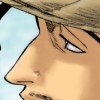
[Just me quietly thinking about Robin: Year One and how Dick literally runs away after Bruce fires him in the wake of his first encounter with Two-Face.
He goes through weeks - possibly months - of physical therapy and rehab to get back to where he was, probably has to come up with some excuse for school once he's healed enough to go back, and keeps hoping through all of it that Bruce might relent and let him come back into the field again, to no avail. Bruce doesn't even speak to him, if they see each other at all; it's implied via Alfred's narration that they don't see each other, since Bruce is nocturnal and Dick ends up adjusting to a more 'normal' daytime schedule.
Weeks, after Dick gets beaten almost to death, and the last thing Bruce really ever says to him before those weeks of silence is "It's over, Dick." Dick's entire reason for staying at the manor is to be Robin. To help Bruce. To be out there, stopping more Tony Zuccos from hurting more people. And that's been taken away.
And I'm not here to bash Bruce for this. The man was panicked. Dick was dying in his arms by the time he got back to the Cave and he was incredibly distraught over it. Bruce was at Dick's bedside when he finally woke up, the man very much cares for Dick's wellbeing and - based on word choice a few panels later - blames himself for Dick even being in that situation to begin with. But Bruce has this incredibly bad habit of giving strong, kneejerk reactions, masking his fear with anger, and then never backing down. I can't blame him for wanting to push Dick out of the vigilante life; that's a sane and rational thing to want after having to watch the boy you brought into that life get beaten almost to death by a villain.
I can, however, absolutely fucking blame him for claiming Dick disobeyed a direct order by even going on that mission when he didn't. Bruce never ordered him to stay out of it, at least on-screen. He asked, and that was it. It's possible he told Dick to stay behind between the conversation on the rooftops and the scene in the Cave later, but I doubt it. It's more likely Bruce was hoping Dick would listen to his warning, forgetting what it's like to be a 10-12 y/o boy who hasn't really suffered defeat before.
Meanwhile, Dick has just woken up from the worst - or at least second-worst - thing to ever happen to him thus far, and when he tries to put on a brave face Bruce yanks what has become his whole world right out from under him. And then doesn't say a word to him. Now, Dick had one arm in a cast from that beating, which means at least six weeks for the bone beneath to heal and the cast to come off, plus several weeks of rehab and physical therapy to restore the muscle. So we're looking at 3-4 months minimum of Dick and Bruce not talking to - or even about - each other, potentially not even seeing each other.
I'm honestly not sure whether Dick had made up his mind to leave before Freeze pulls his stunt with the blood theft or whether that was the catalyst for it. Either is possible, but I'm leaning towards the latter if only because Dick takes the time to write his farewell letter when he goes back to the manor for his mask and his belt before tracking down Freeze and foiling that particular plot all on his lonesome. And then he just. Doesn't go back. Tosses both mask and belt into a trash barrel fire, and takes to the streets. And the letter he leaves behind is very telling as to how he sees his position in the manor and in Bruce's [and Alfred's] life.
"I'm not sure what I'm supposed to do if I'm not allowed to help you anymore." Remember he got pulled out of the only home and life he'd ever known when his parents died; he wasn't able to stay with Haly's Circus [pick your continuity for the reason why, but he wasn't] and Bruce offered him a chance to bring his parents' murderer to justice, which gave a lost little boy something to cling to even once Zucco was dealt with and he continued helping Bruce in his work.
"Alfred doesn't need to worry about entertaining me and taking care of you, too." Dick doesn't see that he has any purpose at the manor as a civilian; from his perspective he'd just be turning Alfred into a glorified babysitter, when the man has enough on his plate making sure Bruce takes care of himself.
"You don't want a partner. And you don't need a son." Dick hasn't been formally adopted. He's only Bruce's ward, not his son. That means that he's not family. So if he's not Bruce's son, and he's not Bruce's partner, then what place does he have in Bruce's life at all? The man has spent the past three months not even trying to talk to him. No word, no shared meals; does Bruce even still want him at the manor?
"I'm sorry I failed you." Bruce places the blame squarely - from Dick's point of view - on Dick's own shoulders. Dick wanted to stay on as Robin. Dick wanted to keep working at Bruce's side. It was Dick's mistake that got a man killed, and Dick's failure that made Bruce fire him as Robin. And the months of complete silence and cold distance from Bruce have only made that worse.
Now, it's debatable what might have happened if he hadn't met Boone and Shrike that night and ended up in Shrike's little Vengeance Academy. Maybe he'd have tried to go back to Haly's Circus, but given there is a panel with a huge poster for them and Dick is pointedly not looking at it I'm not so sure he would have. At least, not at first. I'm not even sure he really had a plan of what to do once he left the manor; Dick's a clever kid, but he's still 12 at the oldest and emotional 12 year olds are not generally known for their careful planning. Especially if the sudden departure from the manor was brought on by his 'last flight' in stopping Freeze. And the story ends, naturally, with something approaching a reconciliation between Dick and Bruce.
Most importantly, it's Bruce who asks Dick to be Robin again. I don't think it's something that Dick would have brought up, not after coming a literal trigger's-breadth away from killing Two-Face. That scared him. Enough to make him go back to the manor and leave a note for Bruce telling him about Shrike and the Vengeance Academy, and enough for him to see it as a further failure on his part and a sign that Bruce is right and he's not worthy of being Robin. He says as much to Alfred when the man finds him writing the note. "I almost killed a man. I could have done it. […] It was so close, Alfred. Bruce is right. I can't stay here."
Remember that Bruce never kicked Dick out of the manor; he fired Dick as Robin, but never said he had to leave. That's entirely Dick's take on it. If he's not Robin, then what place does he have at the manor at all? None. So if he's not good enough, if he can't live up to Bruce's expectations, then he has no real purpose there.
Now, Dick has always had that insecurity to him - I've read the 1960s Teen Titans comics, it's a part of him there, too, before R:YO was ever written and in a completely separate continuity besides - but this, I think, is where it really solidifies and takes hold: a little boy whose at least mildly misguided take on his situation is that if he can't live up to expectations, be what his mentor wants him to be, then he has no place there.]
#outofinspiration#concerning dick#this has been on my mind for a solid week or more#and i'm tired of dealing with it alone#so have some word vomit >>;
4 notes
·
View notes
Text
Without a Compass, Without a Map
by Firecat23
“On second thought, everything is decidedly not okay, and I’m blaming you for it Wade.” While Peter was mostly joking, the situation was far from ideal, and he was a little irked at his friend for having been the one who got them into it in the first place. But rationally he knew, the device had malfunctioned somehow (maybe it was the busted microwave resistor? The transformer he’d taken from a busted up lamp? Who knew, the options were endless really), and now they were trapped until Peter could find some way to fix it.
OR
Matt Murdock has been missing from New York for months. The remaining members of Team Red are getting worried, but what happens when Peter's newly invented prototype inter-dimensional portal malfunctions leaving them stranded in Gotham? Will they find Matt? Will they get home? Will they survive Gotham And most of all, will Gotham survive them?
Words: 1515, Chapters: 1/?, Language: English
Series: Part 6 of Echolocation
Fandoms: Batman (Comics), Batman - All Media Types, Spider-Man - All Media Types, Marvel Cinematic Universe, Deadpool - All Media Types
Rating: Teen And Up Audiences
Warnings: No Archive Warnings Apply
Categories: Gen
Characters: Dick Grayson, Tim Drake, Bruce Wayne, Matt Murdock, Peter Parker, Wade Willson, Jason Todd, Damian Wayne, Barbara Gordon
Relationships: Matt Murdock & Peter Parker & Wade Wilson, Batfamily Members & Team Red, Matt Murdock & Peter Parker, Peter Parker & Wade Wilson, Matt Murdock & Wade Wilson
Additional Tags: Alternate Universe, Alternate Universe - Canon Divergence, Canon? What Canon?, Not Canon Compliant, Crack Treated Seriously, Crack, Alternate Universe Travel, shenannigans, Team Red, Universe travel shenanigans, Rated T for language, Wade Willson does as he pleases, Blind Matt Murdock, Stranded, Peter Parker has no self preservation instinct, tags to be updated as I write more of the fic
source https://archiveofourown.org/works/46506175
0 notes
Text
Alright, I'm back to this.
I already addressed in my reblog why Dick is considered to be an emotional support pillar in the Batfamily, not only for Bruce. Now I want to talk about this part in the og post, specifically:
"but. there have been instances where - like alfred - he enables bruce's behaviour and/or makes excuses for it."
I want to say that I agree. However, I want to elaborate on why I agree and why Dick could be considered an enabler.
Let's first define what enabling means to have that out of the way:
“The term "enabling" refers to the act of allowing or permitting someone to continue a behavior, habit, or addiction, often by providing support, resources, or excuses. Enabling can be both intentional and unintentional, and it can have a significant impact on the individual's life and relationships.”
So, at first, I didn't think Dick should be classified as an enabler since it isn't his responsibility to control what Bruce does. However, reading more about the subject, enabling includes taking on responsibilities for the other person and avoiding conflict by ignoring someone's harmful behavior or not putting any boundaries, which gives the other person the go-ahead to keep crossing those unspoken boundaries that you never really settled.
Although I would like to argue Dick does try to have some boundaries with Bruce, most of the time he lets him get away with lots of things he does to him. I mean, we know of the long history of abuse there is from Bruce to Dick, even if his actions are not always his fault/intentional. (See: mind-control, hypnosis, accidents, etc.)
I'd like to be corrected if I'm wrong, but I don't think there's a time in which Dick has directly addressed Bruce's not-so-great parental skills. Lack of safe environment for emotional vulnerability? Poor communication? Putting so much responsibility in the hands of a child? And I wouldn't say it is for not trying to make Bruce responsible. But when he was a child, confronting him about these things… Dick just wasn't suited for it. No matter how much insistence there might be from his part about them being equals, Bruce is and always was an authority figure. He was the owner of the manor, he was who had right over their equipment and the cave, he was the oldest—the parent, and Dick had no way to go against that without feeling like he was going to war in his underwear with a stick for weapon against a fully-armored warrior with shield and sword to attack.
And as an adult, having a discussion about any of this might be even harder because he's been since childhood rationalizing and excusing Bruce's behavior just so he could justify to himself why he couldn't say anything about it. Why he was letting himself get hurt without fighting back.
In his mind, Bruce always has some kind of reason. “He was traumatized”, “he was grieving”, “his parents had died when he was much too young, how could've he known better?”, “he tried his best”, “Dick understood Bruce better than anyone else, why would he need to communicate or show him affection when it's all hidden under the small gestures?” and it could go on and on.
That's where the excusing Bruce's behavior, thus enabling him, comes. This is where Bruce gets a pass because hey! He can't be blamed when it was a result of the circumstances! (But it does become a fault when he keeps going with the flow instead of trying to change the direction. “The circumstances” stops being an excuse when you're the one who contributed to them.)
And as the family grew, Dick started taking on more responsibilities for Bruce because Dick knows Bruce isn't apt to be everything the others would need. That lack of communication? Dick compensates by explaining for Bruce. The affection? Dick will give it to them. All the parentification? Brushed under the rug. Nobody notices (or ignores it) and it's a cycle of enabling Dick to be codependent and Bruce to be emotionally immature.
But despite all my previous points, Dick isn't always like this. He isn't letting things go everytime something happens. He isn't looking the other way to all the things Bruce does for his sake. In fact, out of all the kids, I'd say Dick is the one who's confronted Bruce the most.

Batman #416
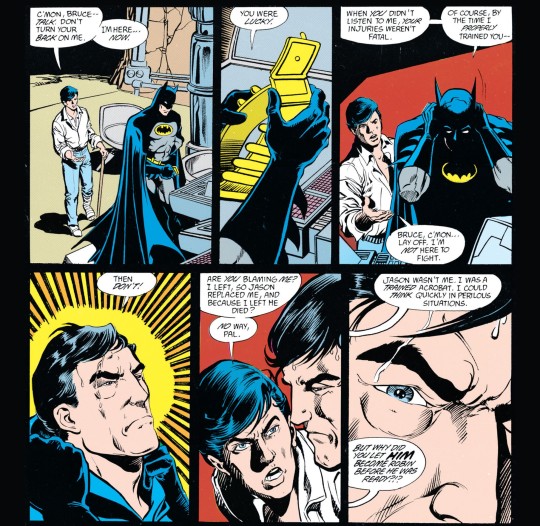
The New Titans #55

Batman #600

Nightwing (1996) #99

Outsiders vol.3 #21
And although he excuses Bruce to himself, he does let others know about Bruce's harmful behavior and encourages them to set boundaries.

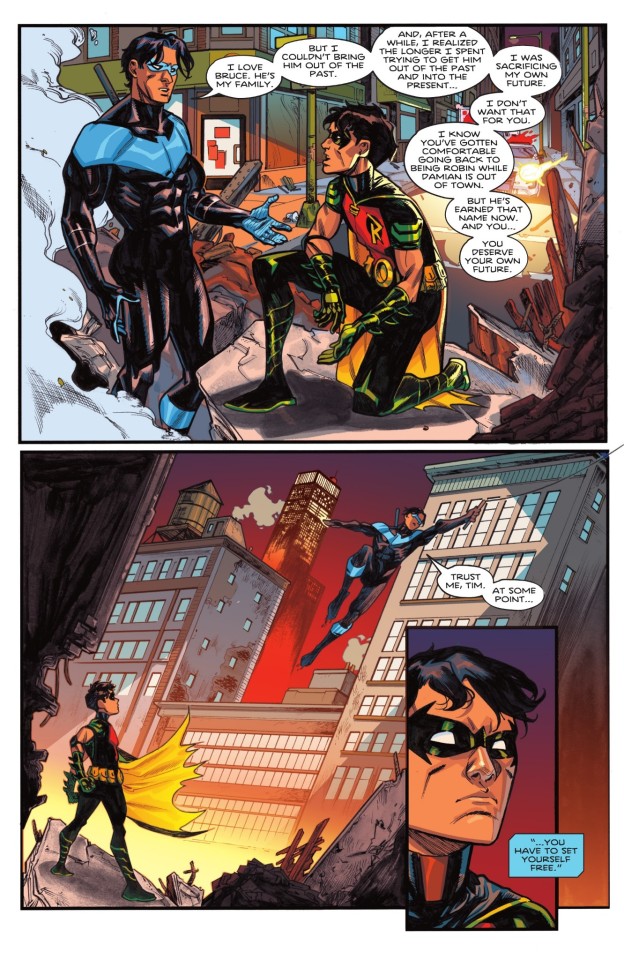
Batman: Urban Legends #10
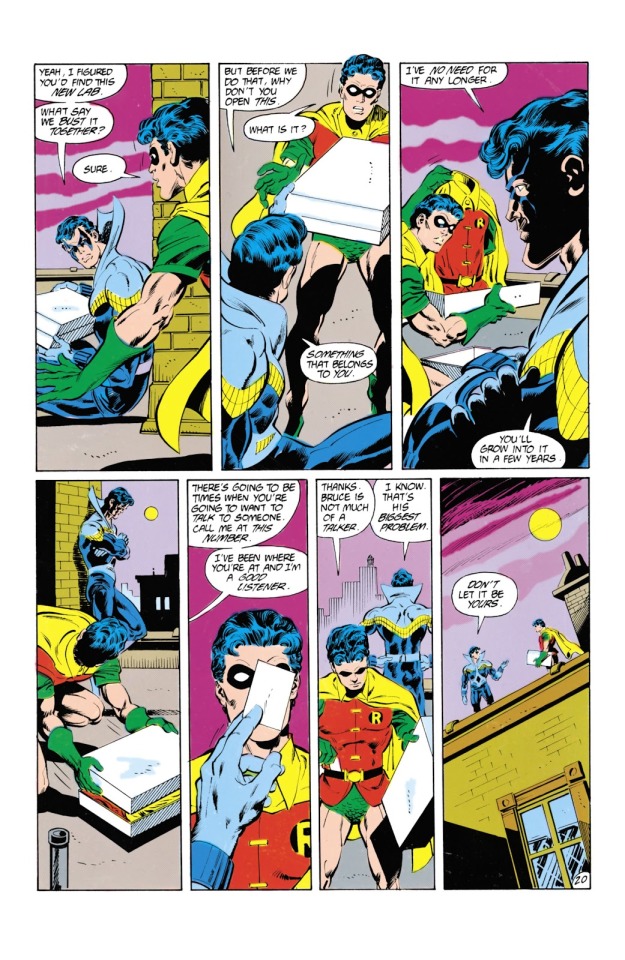
Batman #416
So, in conclusion, Dick both is and isn't an enabler. He excuses Bruce as much as he doesn't. He ignores his faults but also confronts him about it. He allows him his flaws and he points them out.
What I'll say is that Dick isn't like Alfred in this aspect, but he does on occasion unintentionally enable Bruce, even if not always.
Now, Bruce and Dick aside, I want to have a section to talk about why I dislike using the term ‘enable’ when it comes to a parent-child relationship. (You can skip over this, just a personal opinion that I felt the need to share. But it isn't needed for my argument, so is just an extra to my post)
When a child ‘enables’ a parent it can mean a few different things:
Making excuses for their parent's behavior.
Taking on responsibilities.
Providing emotional support.
Ignoring the issue.
Accommodating the parent's needs.
These all cause the parent to avoid responsibility, have no consequences for their actions and have their own scapegoat and emotional support that will make it easier for them to avoid seeking help or attempting to become better due to the lack of repercussions to their actions.
However, it really isn't the child's responsibility to make the parent see where they're going wrong. It isn't their job to go “Hey, actually, you should get help because you aren't treating me like your child”. They aren't the ones who have to constantly communicate their needs and point out the shortcomings of the adult, so it always gives me this sense of wrongness when I use this word for these cases because, really, it's more about the parent enabling the child by permitting and encouraging the parentification of said child than the child enabling the parent to be an awful guardian.
Yet again, that's just my opinion. I can change what the word means and what it includes in its definition. But I can have and voice my thoughts about it and believe there should be a different way of calling it that doesn't make it sound like the child is the one at fault for their parents behavior.
#dick grayson#nightwing#bruce wayne#batman#dc comics#dc#character analysis#long post#batfamily#bruce and dick
126 notes
·
View notes
Text
That last reblog has me now contemplating.
What if to mess with his shiny new little brother, but like....gently....when they first started hanging out Dick told Jason a couple of slight falsehoods as umm. A training exercise. That’s it. It was about helping Jason get up to speed with his information gathering skills and also his bullshit detection. So in the interest of being helpful and A Good Big Brother, Obviously....Dick sowed a few.....less-than-entirely-factual details about the more fantastical elements of their lives. The stuff that isn’t common or public knowledge to most of the DC Earth. And then he just.....waited to see how long it took Jason to realize Dick had fed him a handful of straight up lies when briefing him about All Things Superhero.
Look, it was for Science. That’s Dick’s story and he’s sticking to it.
Thus, for the first couple months of their new sibling relationship, Dick had Jason convinced that Atlanteans were actually aliens who landed here thousands of years ago, speedsters can run so fast they can travel back in time, and Superman once accidentally let out a burp so forceful it created a shockwave that shattered every glass in a quarter mile radius so whenever he starts to look....gassy....your best course of action is to hit the deck. Don’t even hesitate for a second, just dive to the ground and grab some floor until he’s got it back under control. And oh yeah, Diana has her Lasso of Truth, but Donna’s version of truth-related powers is that she can sense when people are up to no good....only, the way this manifests for her is she suddenly registers a distinct bad smell in her vicinity, alerting her that bullshit is afoot.
“You’re kidding,” Jason said flatly. “You expect me to believe that Donna can literally smell bullshit?”
Dick just raised an eyebrow. “Like that’s somehow less plausible than Gar being able to change into any kind of animal but only in shades of green? And oh yeah, speaking of green, Green Lanterns can do just about anything with their rings....except protect themselves from yellow paint? I don’t make the rules, Jace. The truth is sometimes superpowers aren’t super-glamorous and not everything related to magic or gods or other planets is as....sophisticated...as we presume. I mean, its not like these things exist just to match up to our expectations for them. Why should alien civilizations or the rules of magic be influenced by whether or not our society would find something weird or ridiculous?”
Jason chewed his lower lip contemplatively. He lacked an official bullshit detecting power himself, but he did have good instincts. Unfortunately for him, his shiny new big brother gave good Lying-to-your-face Face.
“Plus, if you really think about it, it does make a kind of sense,” Dick continued to explain helpfully. But only according to certain specific interpretations of ‘helpfully’ that actually mean ‘like a liar.’ “Our brains are constantly translating all kinds of input and stimuli into shapes or patterns we can actually process in a way that means something to us. So we can make use of that information. This is just the same thing. Donna’s power takes however many variables are involved in registering something as false or something she needs to be wary of...and just condenses it into a simple ‘red alert’ indicator that takes all that abstract, ephemeral data and makes it something actionable. Something she can actually do something with. Her power - or how her brain perceives it - just didn’t actually consult her or give her a choice of notification settings, because why would it?”
“I guess that makes sense,” Jason begrudgingly agreed, with a frown that suggested this particular ‘truth’ Offended his sensibilities.
“I mean, you can ask Donna to explain it herself if you want,” Dick said with a shrug. “Just a heads-up though....she’s not really a fan of how that power works either. Its not exactly a superpower anyone wants to be known for, and she’s heard allllll the jokes about it by now. Roy, Wally and I were perhaps....not the most sensitive when we were younger and she was honing that particular skillset? Though in our defense, I maintain that most of our jokes were hilarious. But anyway, just saying. If you wanna bring it up with her directly, go right ahead! Its definitely one of her favorite topics and Amazons are for sure known for how well they handle being self-conscious.”
And that’s the story of the three months Jason spent convinced that Atlanteans were from another planet, confusing the hell out of Garth with his occasional references to ‘your homeworld’ and his numerous questions about all the Atlantean Green Lanterns that he for some reason seemed convinced the Green Lantern Corps must obviously have a long history of.
And its also why Jason spent those same three months getting wide-eyed and nervous any time he noticed Donna’s nose so much as twitch when he was around. Which it did a lot more often than usual, thanks to how often Dick got horseradish to go with whatever he was having for lunch, knowing full well that Donna can not stand the smell of horseradish. (Dick’s actually not a fan either, and he hates how it tastes, but he’s not afraid to Suffer for the sake of Shenanigans. Its a fundamental part of the Robin experience and persona, after all.)
But it was the Donna thing that gave Dick away, ultimately. No matter how hard he tried to keep a lid on how entertaining he now found the sight of Donna’s occasional nose twitch...even a Batkid poker face can’t keep an empath and telepath from finding this a mystery worth untangling after the tenth time it happens.
(Not that Lilith or Raven are gonna apologize for prying any time soon. They had an obligation as his friends and teammates to investigate when he’s acting bizarre, y’see. What if its because he was brainwashed again? “We’re intrusive because we love,” Lilith insists with zero shame. Raven clarifies: “I was intrusive because she was already doing it so there seemed no point not to.” Lilith points out that this could also be construed as a sign of strong leadership potential. Dick glowers. Lilith waves a hand dismissively. “We can circle back to that later. That’s fine.”)
Anyway, the truth came out at last, Jason cites this as the Moral Justification for every single time and way he was a pain in the ass to Dick in the years to come, and Donna - who was Not Amused - gave a pointed sniff and called bullshit when Dick tried to claim this was an important Bonding Opportunity for he and Jason, wherein they became brothers ‘for real’ instead of just via Bruce. “There are intricate sibling rituals to be observed,” Dick insisted. “I did my research! We had so much time to make up for, I had to speedrun through my shenanigans to get us all caught up! Would I have done all this if I didn’t care?”
Every Titan in the room, familiar with the lengths he’d gone to when messing with Rogues and randos as Robin and thus distinctly unimpressed: Yes. Absolutely. One hundred percent.
Dick foraged on heroically. “Regardless! That’s not the case here, as all of this was clearly done in the name of brotherhood and bonding! We’ll laugh about this someday, you’ll see!”
Ten years later, after Jason’s returned as the Red Hood and reintegrated with the Batfamily to varying degrees, enough so that he accompanies Dick and the rest of the OG Titans on a mission where they’re ambushed, captured and trapped in a supervillain dungeon they’re now trying to escape...
Dick: Definitely kicking myself for not seeing that ambush coming. Where’s a bullshit-sniffing power when you really need it, huh?
Jason: Still not laughing yet.
Dick: Oh come on!
As far as the rest goes, Jason does get a kick out of the speedsters discovering that actually, they can run fast enough to travel through time. He’s like, despite your best efforts you accidentally got one right. And Dick’s all ‘was it an accident or did I actually know or have strong suspicions all along’....but Jason shuts that down. “Nope. Not giving you this one. Try it with someone else.”
However, that still left one last card in play, long after everyone - even Dick and Jason themselves - had all but forgotten about it.
See, every Batkid knows that the best lies contain elements of truth. And that’s why Dick only peppered in his fake trivia very, very sparingly amidst a massive info-dump of actually accurate and useful info he gave Jason about all that stuff, way back when.
So despite the handful of things Dick had told him that Jason eventually discovered to be untrue...the vast majority of it did check out.
Which means even once he did catch on to Dick’s game....that didn’t change his acceptance of the stuff that had turned out to be true or verified by others. But in the end, there was only one little fib that slipped under the radar. Because the scenario it was based on just never happened to come up until long after Jason had returned....and thus Jason never had reason to put much thought into actually questioning whether or not it was true. Not until long after he’d stopped scrutinizing stuff Dick had told him, in search of possible ‘traps.’
And THAT is the story of how Jason - on one of the rare occasions that he joined the Titans and Justice League for an all-hands-on-deck kinda teamup - just happened to be in the right wrong place at the right wrong time to notice Superman suddenly start to look queasy after trying some alien cuisine....
And without a second thought, Jason just instinctively dove for the floor. With this followed by Clark letting out an extremely normal-sounding burp and a sheepish apology.
Everyone else, staring at the infamous Red Hood ducking for cover because Clark had a moment of indigestion: umm. wut
Dick, staring wide-eyed at his brother and trying not to laugh: Oh shit. I totally forgot all about that.
Jason, almost conversationally, while climbing to his feet and stalking ominously towards his big bro: Hey can you believe that after all the shit we’ve been through and all the times we’ve fought over like...actual life and death stuff, THIS is the thing I’m actually gonna kill you for?
Dick, backing away, hands raised placatingly: Hey, c’mon now, Jace, we called a truce about all this ages ago, remember? It was a much younger, dumber me who did all that in the first place, y’know? You’re better than this!
Jason: I’m really not.
Dick: Well then can I just take this opportunity to mention again how sorry I am for any creative embellishments I might have once come up with, in the mistaken belief that I was honoring important traditions of brotherhood, and....
Jason: Hey, where’s Donna? Can anyone see if her nose is twitching?
Donna and the rest of the Titans, blatantly amused and offering no explanation to the very confused Justice League: Oh, bullshit absolutely detected. In the interests of Truth and Justice, you should totally proceed.
Dick, jabbing his finger at his teammates before dashing for the door: Betrayal! J’accuse!
Donna, shrugging: Sorry, Rob. Justice demands impartiality. Our hands are tied.
Jason, running out the door and down the hallway in pursuit of his fleeing brother: Yeah you better run! I’ve waited ten fucking years to get back at you for this shit. Where you going anyway, bro? I thought you wanted to laugh about this someday!
Dick (offscreen): I regret nothing! It was all worth it! You should have seen your face!
Jason (offscreen): You couldn’t even see my face, idiot! I’m wearing my fucking helmet!
Dick (offscreen): Semantics! If something’s funny enough, you can sense what someone’s face probably looks like! If you know, you know!
Jason (offscreen): Oh yeah, go ahead and make up some more shit, Grayson, that’s definitely the right way to go here!
Batman, looking to the Titans and waving his hand at...whatever all that is offscreen: Explain.
Roy: Hey don’t look at us. You’re the one who made them brothers. This is on you.
Batman: What does that even mean.
Lilith: If you know, you know. Dick’s right about that much at least.
The Titans all nod like an actual, self-evident truth was just expressed. Bruce pinches the bridge of his nose, and starts muttering under his breath.
“You need to encourage Dick to seek out and make like-minded friends, Alfred said. It’ll be good for him, he said. Its what he needs and definitely not the point everything starts to go downhill.”
Lilith picks it up loud and clear, because of course she does, and incidentally, the smug, obnoxious know-it-all teenage psychic who started hanging out with Dick when they were teenagers has absolutely nothing to do with Bruce’s profound dislike of telepaths, nooooo, that would be ridiculous and irrational, to bear a grudge against everyone with a particular skillset because one of your son’s childhood friends was a royal pain in the -
Lilith: Oh, that’s adorable. He thinks we’re the reason Dick’s so profoundly weird and inexplicable.
The Titans, in unison: LOL.
Roy: The self-deluding, it is strong in that family.
Bruce is suddenly extra glad he’s wearing a cowl that hides what is definitely not a pout but might be mistaken for one by the uninformed thus its better to just dodge that issue entirely. He crosses his arms and stares down the collection of his eldest son’s friends, whom he has been unfairly plagued by since most of them were pre-pubescent little demons. Literally no one has suffered like he has.
“I don’t like you,” he informs them officiously. Not sulkily. Officiously.
Several of them snort. There’s a couple giggles. An eye roll from Roy. An aborted response hastily turns into Wally coughing into his hand. Blatant dismissal from Victor, his attention clearly on whatever he’s browsing online. Three varying shades of raised eyebrows: unflappable bemusement from the sorceress, patronizing amusement from the psychic, naked incredulity from Donna. Garth gazing off into an empty corner which he has on very good authority is basically the Atlantean version of the middle finger.
“Yeah, no shit,” Roy drawls, apparently on behalf of the whole group.
Ugh, they’re just. The worst. Why couldn’t Clark have had a kid Dick’s age so he never had to go looking elsewhere for socialization? That’s it. Clearly this was all Clark’s fault. He can’t believe he never realized that before.
Dammit Clark.
#this started out as Dick and Jason shenanigans and then somehow morphed into Bruce really doesn't like his kid's friends#because I firmly believe the Bruce vs the Titans antipathy is one hundred percent a two way street#and not so deep down Bruce (super rationally) blames them for some of the distance between he and Dick over the years#the world's greatest detective is like 'well Dick and I (mostly) got along just fine until THEY came along and then all of a sudden it was#oh sorry Bruce I cant hang out cuz I gotta go play with all my friends who hate you because they're horrible little goblin children#and look I've connected the dots' because correlation is definitely causation#cut to Bruce grumpily slouched in the Watchtower's monitor room watching the Titans mop up the Fearsome Five#to loud public acclaim#Clark hovers nearby. both figuratively and literally. he is Concerned#'Bruce you do know that resenting Dick's friends and holding a grudge against a bunch of fifteen year olds because#your kid doesn't always want to hang out with you anymore is Not the solution to repairing your relationship with Dick that you're looking#for right? please tell me that you know that'#Bruce. testily. 'yes Clark I know that'#Clark: okay. good. I was just worried because it. umm. doesn't always LOOK like you know that#Bruce: well I do and you can stop bringing it up. friends dont rub their friend's irrationality in their faces#Clark: see I dont think I know that rule#Clark: Im pulling from the book that says friends dont let their friends declare a feud against teenagers they've decided#are their personal mortal nemesis in some not-super-healthy war for their son's time and attention#Bruce: well your book sounds stupid and wrong and you should throw it away and get a better book like mine#Clark. Sighing because apparently today is a day where Bruce has decided to just Be Like This and resigning himself to letting it go#for now and trying again to get through to him in a week or two instead#'Sure B. Ill get right on that.'
137 notes
·
View notes
Note
“Bruce can’t kill! He’s not a cop. He will just beat the shit out of you, arrest you, and hand you over to the cops who he doesn’t even trust. Also he believes in redemption, which is why he utilizes the Gotham prison system despite it never being focused on redemption or rehabilitation and also he continues to utilize Arkham despite it canonically making everyone worse!”
The issue isn’t just that Bruce doesnt kill the mass murderers of Gotham, it’s that his moral stance has no nuance. He doesn’t believe in self defense or defense of others. If bane was killing Damian and Damian killed bane to save himself, Bruce would blame Damian. There’s no room in his ideology, it’s just as extreme and skewed as other characters. AND! He can’t just let it be his own ideology. He has to force it on other people as well
I‘m assuming the second one is from the same anon! If not I’ll still answer in one since they work together
You‘re bringing up multiple interesting points here so I‘m gonna break those down briefly!
Batman‘s (Legal) Authority
He’s a vigilante. He has been enemy of the force for a time. The fact that he’s allowed to operate at all hinges p much only on the fact that he’s going after criminals and Gordon like him. And the moment he goes after criminals that are on the “legal” side of things, he’s public enemy #1. He’s never had any kind of binding legal authority.
Violence used in arrests
Batman is violent. Sometimes it’s on purpose, to show him losing control and going to far, sometimes it’s just “Haha Batman go punch” comic book narration style. But we also see panels of Batman talking people down, not using violence as a first, middle, last and only resort. And my original point about that was that “beaten up” is still better than “dead”.
Reliability of the system
I mean, yeah we know the cops and Arkham suck but what else is he supposed to do besides what he’s already doing, weeding out corrupt cops and funding Arkham? He could start his own private prison but we’ve seen in other comics how much that Does Not Work. I think ultimately, Batman sees himself as an emergency service trying to pick up what the system itself can’t do while trying to fix it himself. Meanwhile, people still have to go somewhere.
Humanity/Morality of Batman
Bruce Wayne is a dick. Very my way or the high way, arrogant, and a man of extremes. He cares about people, about love, but Christ he‘s not a good communicator. He‘s got flaws, his inability to see nuance at times is certainly one of them. But what struck me - especially in Batman: The Knight, which was why I added that panel and cannot stop recommending that comic - was that Bruce defines himself by acting out of love, the want to protect, and the realization that if his mission is to save human life, he cannot take it. No matter how much he might resent a person or think they’d deserve it, if he became the kind of person that would kill for his mission, he’d become someone unrecognizable.
Batman‘s ideology as a frame
This is going to sound very dismissive and I promise I do not mean it that way. Batman is a character that says “we don’t kill, period. If you can’t do that, don’t do the job”. Like, that sounds incredibly offensive, but those are the standards to which he holds himself. I’m the best, I can do it without resorting to taking a life, so if you do the same job I’m doing, you should be just as able. Bruce didn’t really make any of his Robins his side kick, they more or less did that themselves, kicking and screaming, whether. Batman wanted them to be Robin or not. If they wanted to, they could drop out (ofc they don’t actually can bc we’d be left without any comics) but they don’t. So we’re back to Batman saying, “if you wanna do the job, you have to be able to do it this way”. Thus one of the Robins taking a life in self defense doesn’t fly because they’re supposed to be better. Is that particularly rational? Well, no, not necessarily, but that’s what it boils down to. If they had to resort to taking a life to save themselves, they shouldn’t have been in the position I’m the first place, but somewhere away from the fight. He trained himself until he could fight without taking a life and thus everyone else who wants to do the same should learn it as well.
All of these are associated with the whole discussion surrounding Batman killing, and you raise interesting points regarding how Batman operates and the hypocrisies involved. The last two are difficult to discuss particularly because we’re still reading comic book heroes and not actual legal irl batvigilante. I think this is still a step sideways from my original point that Batman’s refusal to kill on principle is a valid stance the character should be allowed to keep, but all of this is interconnected.
62 notes
·
View notes
Text
Hit Me With Your Best Shot
Ghost-Maker x Batsis One-Shot
Word Count: 1.2K Warnings: Explicit Language, Mature Themes
Author's Note: Based on this ask right here! Enjoy! -Thorne
**********************************************************************
Being the only non-vigilante in the family besides Alfred meant that she was the one who was normal. Or abnormal in her family’s case—but hey, they still loved their abnormal sister. She was the one who was able to provide rationality from a civilian perspective, another look from a different lens. She was softer too. Much softer than most of her family, quiet, reserved, kind. She didn’t like fighting. Didn’t like arguing and screaming until throats were raw.
Her nights weren’t usually spent outside fighting crime, though she did help out in the cave from time to time, readying equipment, providing food and drinks for before and after patrol routes. Most nights, she was at her apartment or still working. She liked not being a vigilante. Liked being able to go out with her friends at night and not be burdened by last minute bailouts because Two-Face decided to rob a bank or Penguin started a gang war with Joker.
All that being said, she did know her father’s enemies and friends. Being the first child in the manor and with less than two decades between her and him, his enemies and friends were well-known categories to her. Bruce’s oldest friend during his travels, Ghost-Maker, had also been someone she’d known—at least by story. She’d never met him until the night he showed up and challenged her father. Then he became a member of their family, though she could tell the others were wary—she didn’t blame them, but if she didn’t extend the olive branch, she knew they weren’t going to reach out.
They got along well, in her opinion. She liked to be around him and often felt like Ghost-Maker relaxed around her, even to the point that he spoke of his travels. It was no surprise to either of them when they started a romantic relationship. And while he wasn’t particularly monogamous, he seemed satisfied with her for the time being.
***
It was far, few, and in between when they were all in the cave at once, and not dressed in gear about to go out, but instead to hang around and train. She smiled as Cass and Duke wiped the floor with Jason and Dick. Tim and Damian were butting heads about a video game and Steph was leaning over the back of Barbara’s wheelchair, offering insight to some new update the tech genius was creating. Bruce and Ghost-Maker were leaning against the table, quietly murmuring back and forth to each other—in Latin, she had to note, figuring it was because she was in the middle of them, and they didn’t want her to know; she wasn’t upset.
“Jason, Cass, no hits below the belt,” she called out. “You both know better that.”
Cass nodded, readying her position again, but Jason stopped, propping his hands on his hips as he griped, “Okay, but in real life, people hit below the belt, (Y/N).”
She tutted at him. “Jason, you have to be the bigger person.” Raising a fist, she grinned, “Punch ‘em in the face.”
“I can do that!” he chirped.
“I didn’t mean punch Ca—oh, who am I kidding, he won’t be able to hit her,” she huffed, crossing her arms over her chest in preparation for the all-out ass-kicking her second younger brother was going to get; she looked over at Bruce. “Wanna bet on them?”
He chuckled. “Ten on Cass.”
“But I was choosing Cass!” she pouted, then pursed her lips. “Fine. I’ll up it to twenty on Jason.”
“Do you two bet on your family often?” Ghost-Maker asked, and she looked over.
“When it’s a high-stakes match.” (Y/N) nodded at the two siblings circling one another, Duke and Dick had moved off the mats. “Jason and Cass are two of the best fighters alive. Each are capable of going hand to hand with Bruce and lasting for a quite a while.” She looked back at him. “When they really hit their primes, they’ll be better than you and dad.”
He snorted. “There are few people who are better than me and Bruce.”
(Y/N) propped a hand on her hip. “This coming from the man who gets his ass kicked every time you and my dad fight?”
“This coming from the woman who can’t fight at all?” he shot back, and her cheeks warmed, jaw snapping closed at the retort.
“I chose not to fight because I don’t believe in violence.”
“You literally just told him to punch someone in the face.”
“Just because I don’t believe in hitting people doesn’t mean I can’t tell someone. It’s just speech. Words.”
“I think you’re making excuses,” he smirked.
(Y/N) glared. “I think you’re being a jerk.”
“Nice comeback. Did you get it from a laffy taffy wrapper?”
Even Bruce snorted at that one and she couldn’t help but shift her weight between her feet as embarrassment flooded her body. “You are such a nasty person. Rude and nasty and mean.”
Ghost-Maker cocked a brow, at least she thought he did. “Aw, are you upset that I’m faster at firing off than you are?”
She scoffed. “Thanks for reminding me why we stopped screwing. Maybe the next time we do, you’ll fire second?” This time, his jaw went slack, and he gaped at her, but she was quick to add, “And for the record, being rude and condescending doesn’t make you look cool. It just makes you look like an asshole. But you’d know a lot about that, huh?”
“I think I know much more than you do, Primadonna.”
(Y/N)’s eyes narrowed. “Don’t call me that.”
“Oh? So, what do you want me to call you? Miss Snobby?”
She turned to face him. “I’m warning you.”
“I’ve got it! Miss Prude!”
THWAP!
She’d let her fist fly before she even knew what she was doing and not even Ghost-Maker was able to react fast. He reached up, grabbing his nose as blood spilled out his nostrils, staining the rim of the cloth mask he wore. The noise in the cave stilled as everyone turned to face their eldest sister, all gaping, though Jason and Cass wore proud looks. Even Bruce had no idea how to react.
(Y/N), with hot cheeks, thrust a finger in his face and griped, “Newsflash, Ghost-Maker. The Wayne Family motto is ‘talk shit, get hit’.” She sped off towards the stairs, half out of embarrassment, the other half of giddy adrenaline. “I’m going home! Goodnight!”
Ghost-Maker merely watched her back as she left, blinking in stunned silence; Bruce snickered. “My daughter isn’t a vigilante, K. But that doesn’t mean I didn’t train her to defend herself.”
He shot his friend a glare and wiped his nose, feeling the sting, starting to walk off. “Go shove it.”
“And just where are you going?”
“You heard her,” he grinned. “The next time we screwed I had to fire second. Besides, someone’s gotta drive her home.”
Bruce was already starting after him. “That is my daughter you’re talking about! Get back here damnit! I will not let you taint her!”
“She’s already been tainted by me, old friend. Many times.”
“I DON’T NEED TO KNOW THAT, K! JESUS FUCKING CHRIST!”
#ghost maker imagine#ghost maker imagines#ghost maker x reader imagine#ghost maker x reader imagines#ghost maker x reader#ghost-maker x reader#ghost-maker x reader imagines#ghost-maker x reader imagine#ghost-maker imagines#ghost-maker imagine#ghost-maker#ghostmaker#ghost maker dc#batsis x batfamily imagine#batsis x batfamily imagines#batfamily x batsis#batsis x batfam#batfamily x batsis imagine#batfamily x batsis imagines#batsis x batfamily#batsis imagines#batsis imagine#batsis#batfamily x reader imagine#batfamily x reader imagines#batfamily x reader#batfamily imagines#batfamily imagine#dc imagines#dc imagine
403 notes
·
View notes
Note
Love hearing your thoughts on stuff, and currently annoyed with "Tim doesn't think he's good enough to be Robin to an extreme degree" takes, so (if you'd like to answer) what would you say Tim's insecurities/hang ups/damage are?
Thank you! Yeah, I know what you mean. (And, god, there is a point where fanon!Tim is so insecure that I’m like “well shit this kid shouldn’t be Robin because this much insecurity is a blatant liability.”)
I don’t think I would really use “insecure” to describe Tim’s overall personality, though he certainly does have insecurities. I’d also note that the younger he is, the more uncertain he is. He gets progressively more sure of himself as time goes on.
E.g., most of the moments I can recall of Tim comparing himself negatively to former Robins are from his early days, many of them before he even officially became Robin. And that’s a major arc for him in the story where he gets the mantle: he doubts himself, tries anyway, realizes he is good enough, and becomes confident enough to contravene Bruce’s orders and stand by it. Hooray, arc solved.
When he compares himself to others later--particularly to Dick--it reads as more matter-of-fact to me. Sometimes a little jealous, but not really set on cutting himself down. (I’m thinking, like, Robin #10: Tim meets a time displaced young Dick Grayson and notes he’s better at a lot of stuff, but doesn’t get caught up in the thought or turn to self-pity. Or Nightwing #6: talking about the ways Dick is better than him, not as an expression of insecurity, but to say that Dick is doing great as a solo hero while Tim only feels up to sidekicking.)
I don’t see a lot of insecurity in Tim about his skills either. In his younger years, he is well aware that he’s not the best fighter of the bunch and has no problem admitting when enemies are out of his weight class. Towards the end of his time as Robin, into Red Robin, he’s both gotten better and thinks more highly of himself--if anything, Tim can be a little too sure of his expertise.
Overall, I think Tim really internalizes his role as Robin. He doesn't wonder if he’s good enough to be Robin because, well, he is Robin. That’s half his life.
So imo Tim’s hang ups tend to be more along the lines of "am I, Robin, able to solve this problem.” Especially when said problem is about saving someone. Tim puts a lot of responsibility on himself (absolutely unsurprising for a kid whose major adult influences are Bruce and Dick), and stresses over managing it all.
He also carries a lot of guilt when he fails, or interprets himself as failing. (Once again, much like Bruce and Dick before him.) Expect insecurities to suddenly ratchet up after a failure. And that’s a pretty rational thing to be scared of when your job is life-or-death, but it’s still a lot of stress for a teenager (or anyone!) to be under. You can see him beating himself up to the point of moroseness any time he fails to save someone as Robin.
Outside of life and death dangers, this is also a regular feature of his relationship with his dad. Tim usually prioritizes Robin over his civilian life/dad. (The only real exception I can think of is the big one, quitting Robin--but even then it's arguably not even an exception, considering Tim did it as a negotiation to keep Bruce's identity safe.) And he also sometimes does stupid unnecessary stuff like "fly to another country without telling your dad."
It’s complicated, because some part of Tim is aware that his dad is not always a great parent, and a little piece of him is even angry about that--see this coming to a head just after Jack’s recovery in Robin III. But he also loves his dad and desperately wants their relationship to work, and really believes Jack is trying and changing. Tim puts the blame for it not working on himself regularly. So I’d say Tim has a lot of guilt and damage about (in his eyes) not being a good son.
In an unfortunate parallel, the other thing Tim does remain hung up on for many years is the worry that Bruce will fire him. (Ironic, considering he’s the only Robin who Bruce has never tried to remove as a sidekick.) Despite Tim internalizing that he is Robin, he also very clearly thinks of Bruce as the ultimate arbiter. And considering Bruce’s whole personality, it’s not surprising that he (like every other batkid) worries about living up to Bruce’s expectations.
I think it would be reasonable for Tim to also worry that if he’s not a vigilante, Bruce won’t want him at all. Especially considering the history. They met through the work; Batman is the most important thing to Bruce; and when Tim had to quit, Bruce didn’t talk to him the entire time he was away. However, I can’t think of a point where that’s actually brought up and confirmed (or denied) in canon.
Last thing, where ymmv. After Damian’s introduction (specifically, before Bruce dies and Damian becomes Robin), there’s a serious inconsistency in how Tim takes it. In most books, he’s largely unaffected? He and Bruce are in a great place, having recently become legal father and son, and while Tim doesn’t like Damian, he doesn’t really seem threatened. imo this makes sense, because Tim has been secure as Robin and at that point there is zero inclination from anyone to make Damian Robin, no matter how much Damian himself campaigns for it.
However, in Grant Morrison’s Batman, Tim is portrayed as very insecure over Damian’s arrival and position as Bruce’s “real son,” and desperate to prove himself. And, look, I will fully admit here that I am biased. I hate GM’s writing. I hate the way they slightly warped a bunch of characters to fit their new storylines. So it may well be that bias speaking, and you are welcome to disagree! But personally, I find this extreme, outright insecurity to be out of step with Tim’s usual characterization.
Finally, in his Red Robin era, Tim starts with a whole lotta damage about worrying he may be on a wild goose chase for proof Bruce survived, knowing his grief may be coloring his beliefs. Actually finding that proof does a lot to temper his fear, and he gets more confident and bolder again as the quest continues.
And after that, when Tim comes back to Gotham and the second part of Red Robin hits (or, lbr, when Nicieza takes over), Tim’s problem is uh. Well it’s. It’s sure as fuck not that he’s lacking in confidence. End-of-preboot!Tim is secure with his friends and family, which is great, but honestly he could stand to question his actions a little more. Someone give that boy a kick in the head.
#i'm sorry it's been so long!! i had this 75% done in my drafts for ages thinking 'well i just check one reference and get to that soon...'#ty for asking <3#dc#tim drake#*#*dc#dc meta#ask#captainragtag
98 notes
·
View notes